What Is Career and Technical Education, Anyway?

- Share article
Career and technical education has risen on the educational radar in the past decade, transforming itself from a college alternative into a new kind of college pathway.

What is the definition of career and technical education?
Career and technical education–commonly known as career-tech ed or CTE–describes classes that are designed to prepare students for work.
How is career and technical education different from vocational education?
In some ways, it’s not that different. In many high schools, you can still find the same voc-ed classes that existed half a century ago. They prepare students for jobs that don’t typically require college degrees, such as child care, welding, cosmetology, or plumbing.
But in important ways, CTE is very different than your grandfather’s voc ed. Many programs now focus on areas typically associated with associate or bachelor’s degrees, such as engineering or business. Because career-tech-ed classes of all kinds are increasingly seen as roads to additional study after high school, they are meant to be more academically rigorous than those of a previous generation.
How many students are really opting for career technical education programs?
A lot. About 8.3 million high school students—nearly half the U.S. high school population—were enrolled in one or more CTE courses in 2016-17, according to the most recent data collected for the just-reauthorized Carl D. Perkins Career and Technical Education Act , the main federal law that provides funding for CTE programs. That’s up from 7.6 million in 2007-08.
Nearly half of the students in CTE classes are CTE “concentrators,” which typically means that they take two or more related courses in a particular career area.
Isn’t career-tech ed mostly for boys? What about girls?
Actually, that’s an outdated notion. Nearly half of the students enrolled in high school CTE courses are female. Gender-based patterns by subject matter persist, however. Girls far outnumber boys in health sciences and human services, and boys dominate in areas like information technology, manufacturing, and architecture.
What about minority and low-income students?
In the past, voc ed was often a dumping ground for students who weren’t perceived as “college material,” which often meant low-income students and students of color. Adults in schools “tracked” students into two groups: college-bound and non-college-bound. They funneled the second group into voc-ed-classes that too often led to low-paying, dead-end jobs.
Career-tech-ed has gotten much better, but its students are still disproportionately from low-income households and racial minority groups. In 2014-15, 54 percent were from economically disadvantaged families . Fifty-two percent were white, 24 percent were Hispanic, 16 percent were African-American, and only 4 percent were Asian.
Why is CTE becoming more focused on postsecondary degrees? I thought the whole point of CTE was to let students choose to skip college and go right to work.
Two big forces were central in bringing about that shift: New labor-market realities and a troubling past. Let’s take the second one first.
The “tracking” we talked about earlier—where educators classified some students as “not college material” and placed them in voc ed classes—limited students’ earnings and social mobility. Equity activists pressed for change, leading to a “college for all” movement that urged all students to attend four-year institutions.
Important changes in the labor market support the need for college, too. A shifting—and increasingly automated—economy offers few jobs for those without some kind of postsecondary training or degree.
Within the last decade, however, low college-completion rates led to a rethinking of the “college for all” movement . With only about half of college students actually completing bachelor’s degrees, policymakers began calling for a richer set of options for students who didn’t want to go the four-year-college route.
Recognizing these trends, career and technical education reshaped itself as a new kind of pathway: one that includes some form of postsecondary training. That could mean earning certification or credentials in good-paying fields like cybersecurity or robotics, or it could mean getting an associate or bachelor’s degree.
The revamping of CTE means new designs for high school programs, too. The best programs aim to keep the doors to college open by requiring rigorous college-prep classes for CTE students, while also providing them with hands-on learning that lets them apply academics to real-world problems, like designing underwater exploration devices in a marine biology program.
Does career and technical education help students finish high school? And does it influence college-going?
Statistics show that students who take two or three related courses in career-tech ed are more likely to graduate from high school on time than students in general. But they’re not more likely to enroll in college.
If career-and-technical-education students stop with only a certification or associate degree, can they earn as much money as they could with a bachelor’s degree?
Yes. But there’s an important caveat here: It depends on the student’s field of study. In some kinds of jobs, earnings are limited without a four-year degree. But in others, students with only a certification or two-year degree can expect to earn as much or more than those with bachelor’s degrees .
Medical technicians, for instance, can anticipate lifetime earnings of $2.2 million with only a two-year degree, according to a recent study, while elementary and middle-school teachers with bachelor’s degrees have average lifetime earnings of $1.7 million .
Related Reading Donald Trump Signs First Major Education Policy Bill of His Presidency Author Q&A: Looking Beyond ‘College For All’ Career and Technical Education at a Crossroads Career and Tech Ed. Courses Don’t Boost Chances of College-Going, Study Finds Can a Career Tech Ed. School Be Too Popular? Pruning Dead-End Pathways in Career and Technical Ed. Arkansas Students Get Early Start on Career Planning
How to Cite This Article Gewertz, C. (2018, July 31). What Is Career and Technical Education, Anyway? Education Week. Retrieved Month Day, Year from https://www.edweek.org/teaching-learning/what-is-career-and-technical-education-anyway/2018/07 Maya Riser-Kositsky, Librarian and Data Specialist contributed to this article.
Sign Up for EdWeek Update
Edweek top school jobs.

Sign Up & Sign In

- Health Science
- Business Education
- Computer Applications
- Career Readiness
- Teaching Strategies
« View All Posts
Career and Technical Education (CTE) | CTE Career Clusters
What Is Career & Technical Education (CTE)?
- Share This Article
February 14th, 2023 | 37 min. read

Brad Hummel
Coming from a family of educators, Brad knows both the joys and challenges of teaching well. Through his own teaching background, he’s experienced both firsthand. As a writer for iCEV, Brad’s goal is to help teachers empower their students by listening to educators’ concerns and creating content that answers their most pressing questions about career and technical education.
Print/Save as PDF
Career and Technical Education (CTE) has become increasingly popular across the United States as more people realize how crucial CTE is to the country.
Yet, many people remain unsure of what exactly "career and technical education" is.
As a CTE curriculum developer, we've heard misconceptions, confusion, and many questions about CTE over the past 30 years.
Career and technical education (CTE) is the practice of teaching specific career skills to students in middle school, high school, and post-secondary institutions.
CTE is split into 16 career clusters that apply to different high-demand careers:
- Information Technology
- Science, Technology, Engineering, and Mathematics (STEM)
- Manufacturing
- Hospitality
- Agriculture
- Human Services
- Construction
- Arts, Audio/Visual Technology, and Communications
On this page, we’ll take an in-depth look at each CTE cluster to understand what’s included and why they’re important.
Infographic: What Is Career & Technical Education?
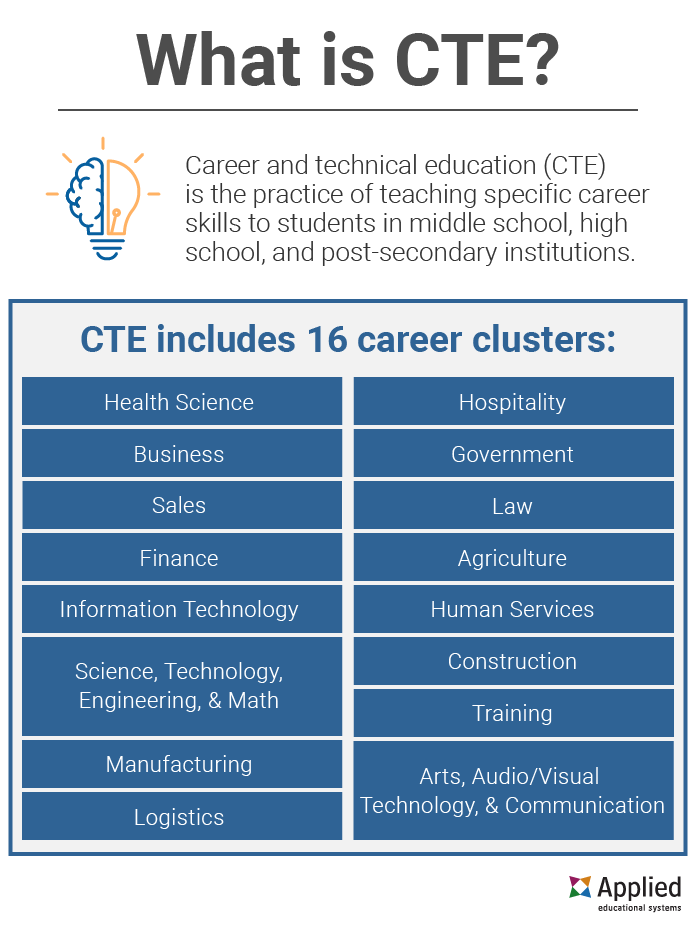
Now that we've reviewed the 16 CTE career clusters, let's take a closer look at the definition of career and technical education.
The Definition of Career & Technical Education
In this section, we'll explore CTE based on the following definition:
Career and technical education (CTE) is the practice of teaching skills-based careers to students in middle school, high school, and post-secondary institutions.
At iCEV, we believe this is the most accurate definition of CTE because it highlights both the unique qualities and the importance of career and technical education.
Specifically, CTE is focused on developing skills and applicable to nearly every age range.
Let's consider these two aspects of CTE in more depth.
1. CTE is Focused on Developing Skills
First, CTE is focused on developing skills . This differs from traditional and university-based education, which is based on theory.
CTE includes some theory, but that’s typically only seen in introductory materials.
Practice, hands-on experience, and application tests make up the bulk of CTE. This is important because CTE careers require workers to have experience in their field before starting a career.
After all, many CTE pathways take students to careers that can save lives. Health science , government, law, agriculture, and construction especially relate to maintaining the health and safety of others.
For this reason, CTE instructors often focus more on practice and improvement instead of textbook memorization.
2. CTE is Widely Applicable
Second, CTE is applicable to almost every educational age range . This is possible because students can understand fundamentals of any career as early as sixth grade, and they can build essential skills well into adulthood.
For this reason, you’ll find CTE clusters and pathways offered in middle schools, high schools, and post-secondary institutions. After completing a program, students can earn the certifications they need to start their careers , many of which are currently in high demand.
At the same time, CTE clusters don’t limit students to single careers. In fact, many students use these courses as preparation before moving onto community college or university.
The Advantages of CTE
The focus and applicability of CTE results in two advantages that you can’t find in many other education fields:
- CTE is highly specialized.
- CTE is incredibly versatile.
Typically, these qualities are at opposite ends of the education spectrum. A teaching method is either general and versatile or specific and inflexible.
With CTE, students can develop a specific set of skills that are still applicable to a broad range of real-world contexts, making them employable in a variety of fields.
Now, let’s delve into the 16 career clusters CTE offers to students.
The 16 Clusters of Career & Technical Education
The 16 CTE career clusters are distinct, specialized areas of expertise in high-demand occupations .
These areas of skill development are rich with expansive career opportunities that allow students to explore what they love. While some clusters are more in-demand than others, each is subject to developments and changes based on new breakthroughs, best practices, and other advancements.
CTE provides an alternative to traditional secondary and postsecondary education, but it's also common for CTE graduates to continue their education at four-year universities and even pursue advanced degrees.
Altogether, this means each CTE career cluster teach students life skills and career skills at the same time, jump-starting their lives and turning them into productive members of their communities.
To get a better picture of the 16 CTE career clusters, let’s take a look at each one individually.
Keep in mind that this is just an overview. Some states like Florida and Texas have their own career clusters, so you'll still want check specific differences in career pathways in your state .
1. Health Science

Popular Careers: Nursing, Patient Care Technician, Certified Medical Assistant
Health science is the largest CTE cluster and one of the most popular today. This cluster includes careers throughout the healthcare industry that deal with the medical care and well-being of patients.
A growing population an increased and consistent demand for health science professionals means that learners in this career cluster have abundant opportunities for engaging careers in a variety of pathways . Today's CTE graduates pursue careers as nurses, patient care technicians , medical assistants, and more.
Although students can advance in healthcare by earning a university credential, students can start many health science jobs immediately after high school when they've earned the appropriate certifications.
Certifications CTE students can take to be employment-ready after high school include:
- Certified Medical Administrative Assistant (CMAA)
- Phlebotomy Technician (CPT)
- Clinical Medical Assistant (CCMA)
- Certified Nursing Assistant (CNA)
Many of these certifications are administered by the National Healthcareer Association (NHA) , which has become one of a handful of distinguished healthcare certifiers. But regardless of the pathway, a certification will help students be prepared for work in specialty of their choosing.
2. Business, Management, & Administration

Popular Careers: Human Resources, Data Entry, Business Management
Business education courses are among the most common in CTE because of their versatility . A background in business prepares CTE students to work in almost every career path or industry, especially management.
While some students will still go on to study business at college or graduate school, CTE business education provides the foundational knowledge students need to work successfully in a corporate setting—or even start a business of their own.
Business management and administration is also an area where CTE students can earn certifications to prove their knowledge.
Some examples of popular certifications include:
- Express Employment Professionals Business Office Technology Certification
- IC3 Certification
- Microsoft Office Specialist
Irrespective of which industry graduates choose to work in, CTE graduates have the opportunity to make an impact in business immediately after completing their programs.
3. Marketing, Sales, and Service

Popular Careers: Marketing Specialist, Sales Representative, Data Analyst
Marketing, sales, and service are all based on the concepts of customer acquisition and customer retention .
Careers in this cluster deal with different parts of the customer experience, but they’re all essential in keeping a company viable:
- Marketing represents the first step in the customer experience and involves developing curious parties into sales leads.
- Sales presents products to leads and develops them into paying customers.
- Customer Service makes sure that customers are satisfied and remain committed to a company for the long term.
Students in this CTE cluster cultivate skills that will help them work in all three of these business areas. They also learn how to work cross-functionally to ensure these departments are aligned to create a seamless customer experience.
To help prepare them for work in a business environment, students in this cluster can earn an industry credential like the Express Employment Professionals Career Preparedness Certification .

Popular Careers: Accountant, Controller, Accounts Receivable
The finance CTE cluster teaches students how to handle small- and large-scale bookkeeping, accounting, banking, and investments.
Learners in this cluster gain a strong foundation in understanding cash, revenue, expenditures, profit margins, and other principles of money management. Although most careers in finance require a college degree, understanding these fundamentals helps prepare students for careers in finance and accounting .
Because finance is a highly-competitive field, advanced degrees help students stand out among their peers. However, CTE finance graduates already have experience to begin working in financial occupations, particularly through earning industry certifications .
Regardless of which pathway they choose, students in the finance cluster develop a substantial background in effective money management.
5. Information Technology (IT)

Popular Careers: Site Reliability Engineer, Information Technology Solutions, Network Specialist
Information technology (IT) is the application of digital networking, information transfer, server reliability, and other 21st Century essentials .
Starting with Principles of Information Technology , CTE students who choose an IT pathway will learn everything they need to bring whole companies online in terms of local servers, equipment maintenance, and networking setup.
Plus, IT graduates walk straight into one of the most lucrative and high-demand job markets in the world. Once students have their IT certifications, they can start careers anywhere from local businesses to international technology corporations.
With the help of a quality information technology curriculum , students will be prepared for a a career cluster where rapid development and change require a unique set of skills and experience.
IT will continue to remain a high-demand career, and the combination of CTE and on-the-job training will keep graduates on a path to long-term achievement in the industry.
6. Science, Technology, Engineering, & Mathematics (STEM)

Popular Careers: Mechanic, CAD Specialist, Engineering Technologies
The science, technology, engineering, and mathematics (STEM) career cluster covers interrelated subjects leading to many scientific and technical careers.
Occupations involving engineering, design, and computer-based machinery often require a background in STEM. This has made STEM one of the most popular career clusters today, with many job opportunities available after completing a CTE program.
Graduates in STEM also have a high earning potential, especially if they pursue a baccalaureate or advanced degree in a field like engineering. However, there are also many opportunities in this career cluster that require no additional education or experience beyond a secondary-level CTE program.
One way CTE STEM graduates can make themselves stand out is by taking classes in Scientific Research and Design or Engineering Science while still in high school.
Taking these courses early will give learners the background they need to start their careers right after finishing high school.
7. Manufacturing

Popular Careers: Production Specialist, Materials Manager, Materials Acquisition
Manufacturing in CTE covers all of the processes, materials, and protocols that are commonly found in mass production .
Manufacturing has remained a major career cluster in CTE because the processes and products of manufacturing drive industries throughout the global economy. Students who learn the principles of manufacturing develop a fundamental set of skills they can use in any industry.
While much of today's large-scale manufacturing takes place overseas, many companies maintaining manufacturing facilities throughout the United States and seek CTE graduates with specialized experience.
Today, welding is a particular popular manufacturing career that is consistently in demand throughout the United States.
Because of their specific knowledge of welding practices and techniques , learners who choose this pathway develop skills that are transferrable to many different professional contexts throughout multiple manufacturing industries.
But regardless of their pathway, students within the manufacturing cluster still have plenty of opportunities for careers as successful CTE graduates.
8. Transportation, Distribution, and Logistics

Popular Careers: Automotive Careers, Logistics Planner, Distribution Manager, Transportations Analyst
Transportation, distribution, and logistics deal with moving and tracking goods and materials and the vehicles used to make transit possible.
Professionals in this detail-oriented pathway often have a keen eye for organization, as well as specialized knowledge in a particular area.
Trucking, shipping, and storage all fall under the umbrella of this CTE specialty. As a result, any company that needs to track inventory will always need transportation, distribution, and logistics specialists.
The transportation career cluster also includes careers related to Automotive, Diesel, and Small Engines .
CTE students who study automotive go on to careers as mechanics and technicians who understand the mechanical and performance systems of household vehicles and light and heavy-duty trucks.
Because transportation careers require a high degree of specialized knowledge, many graduates find that an industry credential like the EETC Principles of Small Engine Technology certification helps them achieve their goals.
CTE students in transportation, distribution, and logistics develop skills that are difficult to find in today's job market. Fortunately, that means these graduates have plenty of career opportunities in almost every area of the United States.
9. Hospitality and Tourism

Popular Careers: Assistant Hotel Director, Guest Experience Specialist, Reception Manager
Hospitality and tourism shows CTE students how to manage businesses like hotels, conference centers, restaurants, and tourist attractions .
Although there are obvious opportunities for hospitality students in regions that draw a large number of tourists, this CTE cluster covers a comprehensive set of hospitality skills students can use to work anywhere in the country.
Graduates in the hospitality and tourism cluster often have experience in Family and Consumer Sciences (FCS) , taking courses in areas like hospitality services and culinary arts .
They can also earn industry certification in areas like professional communication .
Pursuing careers in hospitality and tourism is especially valuable for students who want the versatility to work in a variety of locations or on nontraditional schedules. But regardless of where and when they work, CTE graduates in hospitality and tourism will have consistent career opportunities.
10. Government & Public Administration

Popular Careers: Administrative Assistant, Project Manager, Zoning Specialist
Government and public administration covers the organization of governments and their agencies, how citizens interact with governments, and how governments maintain order .
Typically, that means CTE students learn about issues related to local governments, such as taxes, parks and recreation, budgeting, and city councils. Local governments and their agencies are directly involved in the day to day lives of citizens, so it's critical that graduates in this cluster have a background in managing the many unique challenges of managing municipalities.
While government careers can be lucrative, it's important to remember that even at the local level many public careers involve elected positions. Graduates in this CTE career cluster will often have to participate in politics in order to be successful.
For students in this cluster, a background in professional communications and public speaking can be helpful.
However, regardless of their career aspirations, experience in the government and public administration cluster can give students a unique set of skills they can use to navigate public systems and effectively complete projects affecting organizations and everyday citizens.
11. Law, Public Safety, and Security

Popular Careers: Criminal Justice, Paralegal, Law Enforcement
Law, public safety, & security focuses on emergency services and all legal-based occupations .
This CTE cluster is well-known both for its profitability and ability to consistently provide opportunities to graduates. On top of that, this career path is a great start for students who want to branch into criminal justice, particularly law enforcement.
While many occupations within the cluster require a baccalaureate degree or further education, a high school background in CTE is more than sufficient to start working in law, public safety, and security, including clerical work.
It also gives students the knowledge and skills they'll need to work as paralegals or legal bookkeepers, as well as a head start on more advanced career opportunities.
This cluster is an excellent starting place for anyone looking to get more involved in law, and it pays well enough to keep additional education on the table. But even without further coursework, graduates still have lots of options at their fingertips in law, public safety, and security pathways.
12. Agriculture, Food, and Natural Resources

Popular Careers: Agricultural Inspector, Agronomist, Wildlife Administrator
Agriculture, food, and natural resources (AFNR) teaches CTE students about how human life is sustained around the world through consumable resources.
This allows graduates to pursue a wide range of careers within the eight different AFNR career pathways. While becoming a farmer is might be the most obvious career agricultural science , graduates also work as horticulturalists, lab technicians, administrators, and researchers among many other occupations.
Successful students in AFNR clusters often pursue industry certifications, which earn them a credential from a leading agricultural organization or company.
AFNR industry certifications hosted on the iCEV Testing Platform include:
- ASMA Food Safety and Science Certification
- ASMA Meat Evaluation Certification
- BASF Plant Science Certification
- Benz School of Floral Design Principles of Floral Design Certification
- Ducks Unlimited Ecology Conservation and Management Certification
- Elanco Fundamentals of Animal Science Certification
- Elanco Veterinary Medical Applications Certification
- NCLCA Principles of Livestock Selection and Evaluation Certification
- NHJTCA Equine Management and Evaluation Certification
The number of organizations offering certifications is an example of the varied paths students can choose within the AFNR cluster. This makes this cluster a great choice for any CTE student looking for work that has broad applications and has a direct impact on the lives of people throughout the world.
13. Human Services

Popular Careers: Social Worker, Rehabilitation, Social Service Assistant
Human services refers to careers that focus on the needs of individual people .
Typically, these needs revolve around some element that’s lacking in a person’s life. Social work, social services, and drug rehabilitation all fall under this umbrella. In some states, this CTE background may also apply to special education.
This CTE cluster also includes personal services such as cosmetology and barbering .
Students often follow pathway when they have a passion to help people through providing personal services.
While human services careers frequently pay less than those in other CTE clusters, human services offers rewarding career opportunities that directly affect the lives of individuals and communities. These jobs also continue to be in high demand as a growing population seeks a variety of services.
Ultimately, individuals with a desire to assist others will feel very much at home in human services pathways and careers.
14. Architecture and Construction

Popular Careers: Construction Technology, Construction Inspector, Project Estimator
Architecture & construction CTE students study the principles of designing and crafting structures .
While graduates from this cluster aren’t immediately qualified to become an architect, they are qualified to work at an architect office or construction company.
Students focusing on architecture can be involved in the process of designing buildings and other structures, and may consider postsecondary instruction leading to a degree in architecture. On the other hand, students who study construction can become actively involved in the building process soon after graduating.
With experience in this CTE cluster, students will be prepared for these two sides of construction industry. However, they can also work in a completely different capacity such as an inspector, project estimator, construction technologist.
Learners can also earn industry certifications related to architecture and construction such as:
- EETC Principles of Small Engine Technology Certification
- Home Builders Association of Alabama Residential Construction Skills Certification
Regardless of what careers they choose, the continual demand for new construction and refurbishment projects throughout the United States means that there will be plenty of opportunities for CTE graduates in the coming years.
15. Education and Training

Popular Careers: Training Consultant, Teaching Aide, Safety Specialist
Concentrating in education and training turns CTE students into experts in the learning process, empowering them with the skills they need to teach others patiently and effectively.
While completing a CTE program in education and training isn’t enough to become a teacher in most states, a CTE background in education still makes someone a prime candidate for careers in training and recruitment.
Careers in this pathway can include anything from on-the-job training to consulting. A student in this career cluster can find just as much opportunity in a small business as a multinational corporation — wherever workplace standards are in place.
As a result, students in this field can take the knowledge they've learned virtually anywhere there is a need for teaching and training and have transferrable skills. By learning training and educational principles, they can become excellent teachers — even if they’re teaching new hires at a company.
16. Arts, Audio-Visual Technology, and Communications

Popular Careers: A/V Technician, Audio Engineer, Lighting Technician
The Arts, Audio-Visual Technology, and Communications cluster focuses on the technology that helps create today’s entertainment and artistic expression.
While this could mean drawing, painting, or composing for some students, this CTE cluster is more concerned with operating the technology that makes those products possible. That’s why so many of these students go on to audio engineering, lighting technology, and similar careers.
Skills in these pathways prepare students to apply their knowledge in a variety of settings, from large concert halls and stadiums to smaller venues and nonprofit entities.
As technology evolves, these skills remain in demand to ensure that technical aspects of concerts, sports, and other events run smoothly. With this background, students are always ready to answer the call.
Now that you've learned about all 16 CTE career clusters, let’s discover the settings where CTE is taught.
Where Is CTE Taught?

CTE is primarily taught in three settings: middle school, high school, and post-secondary institutions. Regardless of the setting, CTE focuses on hands-on experience and career skills.
There is often a great degree of variation in the clusters and pathways an individual CTE program offers. Because of the resources required in starting and maintaining a program, it can be difficult to find a school that offers all 16 career clusters.
For this reason, it's common for post-secondary institutions, high schools, and middle schools to offer courses in high-demand industries such as health science or agriculture.
It's also popular for CTE programs to offer clusters and pathways with versatile opportunities for students, such as business education or STEM. This ensures graduates have skills they can apply to almost any industry in any geographic region.
In addition, what programs a school offers can also vary by location. Rural institutions are usually more likely to offer agriculture than urban districts, and the availability of specific industry training such as welding could vary based on local demand for trained professionals.
Fortunately, there are enough schools in the United States offering CTE that it should be easy for most students to find a school that fits their career interests.
Below, we'll look further at the differences between how CTE is taught in middle school, high school, and post-secondary institutions.
CTE in Middle Schools

CTE in middle school is taught as an elective .
Students choose whether they want to take CTE classes, unless they attend one of the few schools in the country that requires one of the career clusters in their curricula.
Middle school CTE classes tend to focus on developing general workplace skills , such as computer applications or career exploration. However, some middle schools also offer learners introductory courses in a specific CTE cluster, such as health science or agriculture.
One of the most common CTE courses in middle school is career readiness because it teaches students transferrable skills they can use in any career pathway.
Ultimately, the role of CTE in middle school is to introduce students to options in a variety of career clusters to prepare them to choose a pathway to focus on while in high school.
CTE in High Schools

CTE in high school is also taught as an elective, but courses are often offered in greater variety . It's the most popular time for students to choose a career cluster and begin taking CTE classes.
At the high school level, students typically pursue a pathway of courses within a single cluster like business or STEM. These courses tend to be taught by instructors with particular industry experience, which allow students to learn highly specialized career skills at a relatively young age.
Often, these courses culminate in certifications by the end of a student's senior year. Many high schools prepare students for these assessments because certification demonstrates learners' competency with a particular set of skills and signals their readiness to begin work as industry professionals.
The certification process and requirements vary between career clusters, but most CTE pathways lead to some form of certification from either a national governing body or from a leading organization or corporation within a particular field.
But regardless of whether students receive a certification while in high school, the structure of CTE programs ensures that they'll be ready to take the next step in their careers.
CTE in Post-Secondary Institutions

CTE in post-secondary institutions typically includes study within a specific cluster and pathway that ends in graduation and often certification .
Many of these students go straight from the institution to starting their careers.
The career pathways at post-secondary institutions take students from introduction straight through to employment. Learners may also have the chance to get first-hand experience with different tools, scenarios, or principles through internships.
However, postsecondary CTE institutions also tend to cost more money than taking the same classes in high school or middle school.
Some of these institutions are also for-profit colleges, which have a poor reputation for quality of education and successful career placement.
Still, taking CTE courses from a postsecondary school is a viable option for pursuing a technical education. In fact, it’s common for many students right out of high school, whether they’re starting their education from scratch or continuing what they learned in high school.
So now that we’ve looked at where CTE is taught, let’s dive into how it's taught.
What's the Best Way to Teach CTE Classes?

CTE can be taught in a variety of ways, but many teachers find it works best when used with blended learning .
Blended learning is an education strategy that features multiple teaching methods to help students learn more effectively than one method on its own.
In most cases, blended learning involves a mix of seven strategies :
- Use multiple types of instructional materials
- Incorporate technology for reinforcement
- Try new teaching techniques
- Keep your traditional methods
- Vary your assessments
- Mix up group work styles
- Try a digital curriculum
Trying blended learning can feel overwhelming, especially with so many things on your plate.
If you're not ready to revamp your teaching style, there is one thing you may be ready to do: improve student engagement in your classroom. For most teachers, keeping learners' attention is the difference between success in the classroom and students being unprepared to take the next step in their careers.
How to Keep Your CTE Students Engaged
Career and technical education is a growing and exciting field filled with opportunities for students. In this article, you've learned more about what CTE is, the 16 career clusters it includes, and where and how you can teach it.
However, getting students to join your CTE program isn't even enough. To keep them excited about future career opportunities, you'll need to keep them alert and engaged in class.
But if you're like the thousands of CTE teachers we've spoken with over the years, student engagement is a constant battle in your classroom. So how can you get your students attention and help them better understand the concepts you're teaching?
Learn more about how to keep students engaged in CTE when you download your free eBook .
You'll learn tips and tricks you can use in the classroom to ensure that your students are focused in class and ready for their future careers.


- Integrations & Access
- Content Partners
- Science Techbook
- Mystery Science
- Pivot Interactives
- DreamBox Math
- Reading Park
- Reading Plus
- Social Studies Techbook
- Augmented Reality
- Professional Learning
- Research & Impact
- Success Stories
- Leadership Blog
- Courageous Leaders
- Communications Resources
- Discovery Educator Network (DEN)
- Virtual Field Trips
- Educator Blog
- Puzzlemaker
- Career & Technical Education
- Teacher Retention
- Supporting Literacy
- Education Funding
- About Corporate Partnerships
- Our Corporate Partnerships
- Join our Network
- STEM Careers Coalition
- Career Connect
Implement a Thriving Career & Technical Education Program
Career and Technical Education (CTE) has been around for decades and has helped millions of students achieve success. So, what role does CTE play today? Today’s educators want to know more about career clusters, career pathways, how AI affects career and technical education, funding, and what a successful CTE program looks like. Read on to learn more about these topics and how CTE can prepare students for success.
Share With Your Colleagues

Download Now: 5 Actions for Education Leaders on CTE Programs
Table of contents, what is career & technical education (cte).
According to the National Center for Education Statistics , Career and Technical Education, or CTE, is defined as the courses and programs in middle and high schools that focus on the skills and knowledge required for specific jobs or fields of work.
In other words, it is an opportunity for students to explore career options and personalize their education pathway based on their career interests as they learn a set of technical and specialized skills needed to succeed in those careers. CTE programs deliver those opportunities to students, and typically include instruction, hands-on training, and certifications that can improve students’ employability and preparedness in a career field.
The concept of Career and Technical Education has evolved over the last 160 years through a variety of legislative acts, organizations, and outreach programs to answer the economic and workforce needs of the time. Today, CTE is an integral part of our education system that prepares future-ready students for a competitive workforce and to become lifelong learners.
What are career clusters?
With the growing number of career fields available, the U.S. Department of Education created the National Career Clusters® Framework to help organize CTE programs, curriculum, and instruction that reflect today’s workforce. There are 16 Career Clusters in the framework that help students understand and explore 79 career pathways —from agriculture, food, and natural resources to transportation, distribution and logistics!
First let’s answer two of the most common questions about CTE to provide more clarity. What is a career cluster and what is a career pathway? A career cluster is a grouping of career pathways related to an industry, like health sciences. And a career pathway, such as therapeutic services, is a group of occupations with similar knowledge and skill requirements. For example, the occupation of a registered nurse belongs to the therapeutic services career pathway, which in turn belongs to the career cluster for health sciences.
Career Cluster
Health Sciences
Career Pathway
Therapeutic Services
Registered Nurse
The National Association of State Directors of Career Technical Education Consortium oversees the Career Clusters Framework. It provides a set of resources for each career cluster and career pathway to help educators develop strategic CTE programs, which include standards, knowledge & skills statements, and plans of study.
Other organizations, like the Bureau of Labor Statistics and state education departments, also use the Career Clusters Framework as a guide to track occupations and career pathways, identify trends, and make adjustments to programs of study and economic projections.
Which careers are trending?
The U.S. Bureau of Labor Statistics (BLS) tracks trends within each career pathway and career cluster. They offer clear data on career information like employment and wages, education and training, and projected job openings. For example, did you know that participation in CTE programs translates to lower unemployment rates and higher benefit rates? T he National Center for Education Statistics is another reliable source for CTE data .
So which careers should we be tracking? Check out the top five career clusters with the fastest growth rate between 2023 – 2030 and the top five emerging career clusters outlined below. According to the BLS , these career clusters are trending due to a variety of technological, societal, and economic factors.
The five career clusters below are projected to have the largest growth rate between 2023-2030 due to a number of factors like an aging population, the emergence of AI, and new technologies in manufacturing. Learn More
- Health Science: 18%
- Information Technology: 15%
- Manufacturing: 12%
- Business Management & Administration: 11%
- Agriculture, Food, & Natural Resources: 9%
The career clusters below are new or rapidly evolving fields predicted to have significant growth in job demand in the near future. Also shown are the factors driving their emergence. Learn More
- Renewable Energy: climate change, technological advancements
- Data Science & Analytics: increased data generation, need for insights
- Cybersecurity: Rise in cyber threats, digital transformation
- Remote Work Solutions: Pandemic, work-life balance
- Mental Health & Wellness: Increased awareness, work-life balance
It’s critical to keep a close eye on these career clusters because rapid growth rate and emerging trends translate into more job opportunities for students. Also, most of these career clusters and their respective career pathways are STEM-related. If you already have a STEM program, curricula, or lab at your school or district, consider how it can work in harmony with your CTE curriculum and how partnerships with industry can support both.
How will AI affect Career & Technical Education?
Artificial Intelligence is taking over conversations, notably within education. For CTE, it’s all about automation, robotics, and how technology is impacting the workforce and our economy. There’s no doubt AI automation will have an affect on CTE and its programs , but it does not have to be a hand-wringing topic. To get ahead of this, educators and students need to understand which career pathways will have less automation risk, and therefore have more high-wage, high-opportunity jobs.
First, how is automation risk measured ? It starts with the skills and training that career clusters and their career pathways require. Transferable skills, for example, are challenging to automate, as well as occupations that require more training or a higher level of education. Therefore, careers that have more of these types of requirements will be less at risk from AI automation.
How should CTE programs adapt?
There are a few steps educators can take to make sure their CTE programs are ready to handle AI and its affects. For one, the programs of study should integrate academic and transferable skills alongside technical skills to give students a comprehensive foundation of knowledge that can be applied across careers. CTE programs should also include work-based learning that provide hands-on experience, and work with the local community to establish apprenticeships that help prepare students for tomorrow’s jobs. Lastly, keep a pulse on which career pathways are trending (as noted above), which skills these careers will require, and how technology like AI will affect them.
How is CTE funded?
Career and Technical Education (CTE) programs, especially those at the high school level, are typically funded through federal, state, and local sources. Even ESSER funds can be used to support CTE programs . Here are some of the common funding sources for CTE programs:
Carl D. Perkins Career and Technical Education Act
Originally signed in 1984, the Perkins Act was reauthorized in 2018 by Congress as The Strengthening Career and Technical Education for the 21st Century Act . The Perkins Act provides $1.5 billion to support career and technical education programs, improve the quality and access of CTE, and align CTE programs with regional economic development. This act requires states to create a sequence of coursework for their CTE program, otherwise known as Programs of Study . You can learn more here .
State Funding
State governments also allocate funding for CTE programs. The amount and distribution of these funds vary from state to state. State funding is typically used to supplement federal funding and support the development, implementation, and enhancement of CTE programs at the local level. Advance CTE tracks information on CTE programs per state , including funding, and shares that information on their website.
Local Education Agency (LEA) Funding
LEAs play an important role in funding CTE programs. They allocate resources from their education budgets to support CTE courses, facilities, instructors, and program management. The specific funding levels and mechanisms vary depending on the local district's priorities and financial capacity.
Local Industry Partnerships
CTE programs often form partnerships with local businesses , industries, and community organizations to provide funding, equipment donations, or in-kind support. The funding from industry partners can also help align the curriculum with local workforce needs and support student internships or apprenticeships.
Grants and Foundations
Competitive grants or donations from foundations, nonprofits, or philanthropic organizations can also be used to fund CTE programs. For example, they can be used for program expansion, innovation, or targeted initiatives to address specific educational or workforce development goals.
An important point to note is that funding should be a reflection of the local educational priorities and policies, as well as the workforce. If you’re looking to fund a CTE program, start locally!
Let's Tackle CTE Together
Learn how discovery education can help.
- Prospective Students
- Current Students
- Faculty / Staff
- Make a Gift

- How Online Learning Works
- Academic Programs
- Why Ball State Online
- Services for Online Students
- Costs and Paying for College
Ball State University
Scholarship information.
- Master's Degree in Career and Technical Education
- Colleges and Departments
- Ball State Online
- Master's Degrees
- Communications and Media
- Business and Management
- College of Communication, Information, and Media
Master of Arts
Quick Facts
Next Start Date: May 13, 2024
- Delivery: 100% Online
- Major Credits: 30
- No GRE Required
Connect With Us
Our nation’s economy relies on the strength and skill of its workforce, and you are critical to training and empowering the next generation of technicians and specialists to achieve through skilled, in-demand careers.
Just as you push others to achieve, it’s time for you to take the next step by applying to our affordable, online master of arts (MA) degree.
Student and Alumni Testimonials
“For professionals like myself who are juggling not one, but two careers, I can fit in the time to make a degree happen at my pace.”
READ HIS STORY

“I chose the community college and industrial trainer’s track because I like teaching, learning, helping students, and encouraging them to constantly learn in practical ways that will help them succeed in life and the workplace.”
Read His Story!

Middle school teacher Nic Zimmerman appeared on "The Rachael Ray Show" to demonstrate the correct way to cut vegetables.

Program graduate Erica Tuke has helped give a voice to female students in STEM.
Read Her Story!

"The master of arts in career and technical education program truly helped me achieve so many of the goals I set for the program."

Associate Technical Trainer at Viega Group in Nashua, NH
Industrial Technology Educator at Big Horn High School in Sheridan, WY
Vocational Education Teacher at South Lafourche High School in Galliano, LA
Business Education Instructor at Dutchtown Middle School in Hampton GA
Engineering Teacher at Alpharetta High School in Alpharetta, GA
Twin Rivers Career and Technical Education Director in Vincennes, IN
Instructional Coach at Hammond High School in Hammond, IN
Director of Labs at Tennessee Technological University in Cookeville, TN
Family and Consumer Science Instructor at Springfield Public School District 186 in Springfield, IL
Earn a Master's Degree that Works with Your Life at an Affordable Price
Expert faculty who are leaders in their fields blend industry trends and expertise with tested management and leadership approaches. Always available, academic and technology support staff help you navigate the online experience and explore options to finance your education.
National Rankings
Fully Online
Full-Service Support
Competitive Costs
Funding Opportunities
Career Services
Director of career and technical education license.
If you’re interested in becoming a career center director or assistant director, then you’ll need a director of career and technical education license to find employment in these capacities. For those in Indiana, our program will help you meet the license requirements for Indiana Rules for Educator Preparation (REPA). This license can be completed at the same time as the Master of Arts in Career and Technical Education degree, and it utilizes many of the same courses. For out of state students, please consult your state/provincial teacher licensing office for details. Learn more .
Relevant, Flexible Courses
Expect relevant and flexible online courses with a collaborative learning environment along with Career and Technical Education teachers and Family and Consumer Science teachers from all over the country.
You can take a single course or complete the entire CTE program of study. The master's degree does not automatically lead toward licensure; however, there are courses which may be used for teacher licensure in Indiana. Additionally, the degree can be pursued along with the Director of Career and Technical Education licensure pattern, for those who are interested in becoming a career center director. For out of state students, please consult your state/provincial teacher licensing office for details.
Transfer Courses
You may transfer in up to 9 credit hours from an accredited graduate program as long as the grade is a B or better. The courses must not be older than six years by the time you graduate with your degree at Ball State or the courses will not count due to expiration. The Graduate School decides if the course will be accepted. Dr. Lazaros decides if the course will count as an elective or toward the professional core of courses required by the degree. You must submit official transcripts to the Graduate School for consideration, and you must complete and sign an Incoming Course Evaluation Form (PDF) and send it to Dr. Lazaros .
Our 30-credit hour 100 percent online master’s degree in Career and Technical Education is accredited by the Higher Learning Commission .
Degree Options that Meet Your Career Goals
The master of arts in career and technical education consists of professional core courses, research requirements, directed electives, and your choice of eight tracks to equal a total of 30 credit hours.
View Course Catalog
- BED 620 Improvement of Instruction with Technology (3 credits) (Typically Fall)
- BED 693 Philosophy, Organization, and Administration of CTE (3 credits) (Typically Summer 1)
- CTE 622 Instructional Materials and Strategies for Improvement of Instruction (3 credits) (Typically Fall)
- CTE 625 Problems and Issues (3 credits) (Typically Spring)
- CTE 692 Managing Work-Based Learning Programs (3 credits) (Typically Summer 1)
Required Research Methods
- BED 616 Research Methods (3 credits) (Typically Spring)
Track option courses or 12 credits of directed electives with program director approval
Two recommended directed electives include:
- CTE 660 Organizational Safety and Health (3 credits) (Typically Summer 2)
- CTE 696 Coordinating Training Programs (3 credits) (Typically Summer 2)
Complete the following two courses:
Your choice of two of these courses:
- EDAD 600 Introduction to Educational Leadership (3 credits) (Typically Fall, Spring, Summer 1, or Summer 2)
- EDAD 684 Educational Finance and Ethics (3 credits) (Typically Fall, Spring, Summer 1, or Summer 2)
- SPCE 637 Special Education Administration and Law (3 credits) (Typically Spring or Full Summer)
This track may interest those who aspire to become a post-secondary administrator at a community college, college, or university, or a non-licensed secondary administrator, such as a public-school department chairperson or dean of students. For teachers interested in becoming a licensed administrator, please consider the Director of Career and Technical Education licensure program instead of this Administrative Track.
If you see yourself as a postsecondary administrator, you will oversee student services, academics, and faculty research at a university, college, community college, trade school, or technical school. Your responsibilities will depend on the area you wish to administer, which could include admissions, the registrar’s office, student affairs, academic units, or any number of areas.
Those interested in being a public school department chairperson will direct their respective departments. They are charged with implementing school policy and sharing the needs of the department faculty with administration.

Workplace specialist pursues passion for putting students on a career path
Tiffanney Drummond found her passion in helping high schoolers identify pathways to their chosen careers. Read her story .
For those interested in serving as a dean of students, you will help resolve discipline problems, maintain disciplinary records, help develop and implement school policy, conduct disciplinary hearings, and supervise programs during and after the school day.
Career Outlook
As the demand for workers with postsecondary degrees increases in our nation, more administrators will be needed to serve these students. Through 2022, the employment of postsecondary education administrators is projected to grow by 15 percent, faster than average for all occupations, according to the U.S. Department of Labor, Bureau of Labor Statistics.
Through 2022, the employment outlook for public school administrators is expected to grow by 6 percent.
Disclaimer: The name of this track does not show up on your transcript. Course availability is not guaranteed and is based on adequate enrollment and faculty availability. Some prerequisites may be required.
- EDAC 631 Adult and Community Education (3 credits) (Typically Fall or Spring)
- EDAC 634 The Adult as a Learner (3 credits) (Typically Fall, Spring, or Full Summer)
- EDAC 635 Strategies for Teaching Adults (3 credits) (Typically Fall, Spring, or Full Summer)
Select additional elective(s) with advisor approval.
If you have a teaching license and would like to become a CTE teacher, you will need documented occupational experience in the area you wish to teach. The number of documented occupational experience hours required will vary depending on the state. You may be able to add a CTE license through Ball State’s CTE teacher track within the master of arts in career and technical education. Please note that licensing requirements vary from state to state and are established by state licensing authorities.
Career and technical education teachers typically teach in occupational areas such as computers, graphics, radio and television, health occupations, cosmetology, machining, welding, police, fire and safety, vehicle service, and construction. Most CTE teachers enter the classrooms of public schools, including middle and high schools, as well as community colleges. Others teach in technical, trade, and business schools.
Career Outlook
To replace teachers who are retiring, the need for career and technical education teachers is expected to grow 9 percent through 2022, according to the U.S. Department of Labor, Bureau of Labor Statistics.

CTE Graduate Takes Career Planning to the Township
A 2016 graduate of the Ball State University’s master’s degree in career and technical education (CTE), Annette Johnson was elected trustee in November, 2018, after working in the classroom for nearly 20 years. Read her story .
Disclaimer: The name of this track does not show up on your transcript. Course availability is not guaranteed and is based on adequate enrollment and faculty availability. Some prerequisites may be required.
- CTE 660 Organizational Safety and Health (3 credits) (Typically Summer 2)
- CTE 696 Coordinating Training Programs (3 credits) (Typically Summer 2)
- EDAC 648 The Community Educator (3 credits) (Typically Fall or Full Summer)
- EDAC 655 Continuing Education for Professionals (3 credits) (Typically Spring)
- EDAC 681 Managing Community Education (3 credits) (Typically Fall)
On community college campuses, enrollments have surged in recent years. And according to Higher Education Employment Report, job openings at community colleges are seeing significant growth. Meanwhile, veteran educators are retiring.
Through 2022, the employment of postsecondary teachers is projected to grow by 19 percent, faster than average for all occupations, according to the U.S. Department of Labor, Bureau of Labor Statistics.
Instructors are particularly needed for occupational areas such as computers, graphics, radio and television, health occupations, cosmetology, machining, welding, police, fire and safety, vehicle service, and construction.
Teaching gives you the opportunity to share your expertise. At the community college level, you will divide your time between teaching students and performing administrative duties such as advising and serving on committees.

FORMER CONSTRUCTION PROJECT MANAGER RETOOLS TO TEACH
In the late 2000s, the Great Recession redirected Jim Brunson’s career trajectory. Read his story .
If you think you’d rather teach in an industrial or business setting, you can facilitate in-house training programs that support corporate objectives and provide professional development of employees. Depending on the size of the organization, trainers may plan, coordinate, and teach employees or teach training methods to staff specialists—such as instructional designers and program developers—who provide the instruction.
Job prospects for industrial trainers are expected to grow by 11 percent through 2022, according to the Bureau of Labor Statistics.
Complete the following four courses:
- ICS 664 Cloud Technologies (3 credits) (Typically Spring)
- ICS 649 Cybersecurity Fundamentals (3 credits) (Typically Spring)
The computer technology track is ideally suited for computer support specialists, system and network administrators, system and network engineers, information technology project managers, directors of technology, or information technology consultants.
Whether you already carry such a title—or are looking to transition to such a role—Ball State’s computer technology track within the master of arts in career and technical education might be the perfect career boost.
If you are considering transitioning into a technology field, you might note that employment for such positions is expected to grow by 17 percent, faster than most occupations, through 2022, according to the U.S. Department of Labor, Bureau of Labor Statistics. As businesses and organizations grow and upgrade computer equipment and software, so will the need for day-to-day support services.
This track will connect you with professors who are leaders in their fields and with classmates who are professionals in the computer technology field.
- EDCU 601 Principles and Procedures of Curriculum Development (3 credits) (Typically Fall, Spring, Summer 1, or Full Summer)
- EDCU 620 The Secondary School Curriculum (3 credits) (Typically Spring or Full Summer)
- EDCU 630 The Junior High and Middle School Curriculum (3 credits) (Typically Full Summer)
- EDCU 640 The Alternative School Curricula (3 credits) (Typically Fall)
- EDCU 673 Curriculum Evaluation (3 credits) (Typically Fall)
- EDCU 675 Evaluation of Educational Personnel to Strengthen Curriculum (3 credits) (Typically Spring)
Schools across the country are assessing and improving curricula and teacher effectiveness. So, directors of curriculum and curriculum managers are needed in elementary and secondary schools, and various educational institutions, such as colleges, professional schools, and education support services, to raise education standards.
If you’d like to work with teachers and principals to coordinate and implement standards of effectiveness, Ball State’s curriculum track within the master of arts in career and technical education may be the one to follow.
If you aspire to a position such as a curriculum director, curriculum manager, or an instructional coordinator, the U.S. Department of Labor, Bureau of Labor Statistics recommends a master’s degree. Employment in this field is projected to grow 13 percent through 2022, according to the bureau.

Courses for the Family and Consumer Sciences track will be selected by the student in consultation with the program director. Courses are consistent with Family and Consumer Sciences Pathways as outlined by LEADFCS , and also are consistent with the program pathways for the Family, Career and Community Leaders of America (FCCLA) .
Directed Elective Tracks:
- Education and Human Services (PDF)
- Early Childhood Education Specialization (PDF)
- Hospitality & Food Production (PDF)
- Visual Arts & Design (PDF)
For practicing Family and Consumer Sciences teachers, this track along with a directed elective program pathway choice can be used for professional development or license renewal purposes. This track can also prepare teachers for content area testing for those who are looking to add Family and Consumer Sciences as an endorsement to an existing license. For out-of-state students, please consult your state/provincial teacher licensing office for details. For Family and Consumer Sciences teachers looking to quickly complete a master’s degree for salary rank advancement at their institution, the Master of Arts in Career and Technical Education paired with the Family and Consumer Sciences track may be a good choice.
- ICS 600 Survey of Management (3 credits) (Typically Spring)
- ICS 601 Problems in Information and Communication Sciences (3 credits) (Typically Fall, Spring or Full Summer)
Coursework for this track option covers introductory legal elements and an introduction to examining finances to help build your leadership skills. This track also provides an examination of managing human capital and a survey of marketing.
Follow This Track to a Leadership Role
This track may benefit individuals with expertise in a specific technology occupational area and who want to transition into leadership roles.
Computer and Information Systems Managers
Computer and information systems managers are responsible for an organization’s computer-related activities. They help determine an organization’s information technology goals and are responsible for implementing computer systems to meet those goals.
Job Outlook
According to the U.S. Bureau of Labor Statistics, employment of computer and information systems managers is projected to grow 15 percent from 2014 to 2024, much faster than the average for all occupations. The need for computer and information systems managers will grow as firms increasingly expand their business to digital platforms.
Similar occupations include:
- Application Development Directors
- Chief Information Officers
- Chief Technology Officers
- Computer Operations Managers
- Computer Security Managers
- Data Operations Directors
- Data Processing Managers
- Information Systems Directors
- Information Systems Managers
- Information Technology Directors
- Information Technology Systems Directors
- Internet Technology Managers
- IT Directors
- IT Security Managers
Industrial Production Managers
Industrial production managers supervise the daily operations of manufacturing and related plants. They coordinate, plan, and direct the work of creating a wide range of goods, such as computer equipment, automobiles, or paper products.
Job outlook will depend on industries in which you are employed, according to the U.S. Bureau of Labor Statistics.
- Industrial Managers
- Industrial Production Manager
- Manufacturing Director
- Plant Chief
- Plant Control Manager
- Plant Manager
- Plant Production Manager
- Plant Superintendent
- Production Manager
Administrative Services Managers
Administrative services managers plan, direct, and organize the supportive services of their organization. An administrative service manager’s specific responsibilities may vary. But typically they maintain facilities and supervise activities that include recordkeeping, mail distribution, and office upkeep.
According to the U.S. Bureau of Labor Statistics, demand for administrative services managers is projected to grow 8 percent from 2014 to 2024, as fast as the average for all occupations. The responsibilities of managing facilities and being prepared for emergencies will remain important in a wide range of industries.
- Administrative Director
- Administrative Manager
- Administrative Officer
- Administrative Service Manager
- Business Unit Manager
- Director of Operations
- Facilities Manager
- General Manager
- Industrial Property Manager
- Office Manager
- Records and Information Manager
- Records Management Director
Top executives formulate strategies and policies to make certain that an organization meets its goals. They plan, direct, and coordinate operational activities of companies and organizations.
According to the U.S. Bureau of Labor Statistics, demand for top executives is projected to grow 6 percent from 2014 to 2024, about as fast as the average for all occupations. Demand will vary by industry and is largely dependent on the rate of industry growth. Top executives should face strong competition, says the Bureau of Labor Statistics.
- Technology officer
- Information officer
- General Operations Manager
Sales Manager
In addition to managing their organizations' sales teams, sales managers set sales goals, analyze data, and develop training programs for the sales representatives.
According to the U.S. Bureau of Labor Statistics, the demand for sales managers is expected to grow 5 percent from 2014 to 2024, about as fast as average for all occupations. Employment growth for sales managers will depend mainly on the growth in the industries that employ them.
- District sales manager
- E-commerce director
- Regional sales manager
- Sales account manager
- Sales coordinator
- Sales director
- Sales executive
- Territory sales manager
Training and Development Managers

The demand for training and development managers is expected to grow 7 percent from 2014 to 2024, about as fast as the average for all occupations, according to the U.S. Bureau of Labor Statistics. Job prospects should be favorable, particularly in industries with a lot of regulation, such as finance and insurance.
- Workforce development director
- Development manager
- E-learning manager
- Education and training manager
- Employee development director
- Employee development manager
- Job training coordinator
- Job training specialist
- Labor training manager
- Skills training coordinator
- Training and development manager
- Training manager
Courses to be selected that align with your professional goals and interests after consultation with the program director

The customizable track allows you to design a plan of study that meets your specific personal, professional, or career goals. You will work with the program director and advisor for the master of arts in career and technical education to design a customized plan of study, which can consist of online course offerings from the entire Ball State University graduate catalog.
This track provides the utmost in flexibility. It is typically for individuals who are looking to customize an online master’s degree program to advance their professional goals or help them attain a specific career objective.
The customized plan of study typically is in alignment with a specific occupational area, which may include agriculture, health occupations, computers, graphics, radio and television, cosmetology, machining, welding, police, fire and safety, vehicle service, or construction.
Ready to Apply?
Are you interested in our program? Then it's time to apply!
Students from Other States
Ball State is authorized by the U.S. Department of Education to accept online students from all U.S. states. However, if you are considering a program that leads to professional licensure, some states may have additional regulations. Review our state authorization website if you live outside of Indiana and contact us if you have questions.
Want to Learn More?
Request information and we will connect you to your academic advisor, who can discuss, your career goals, application deadlines, flexible class schedules, and more.
Request Info
Ball State University students pursuing the Master of Arts in Career and Technical Education and/or the Director of Career and Technical Education license, click here for more information on the Dr. Henry A. and Ruth R. Loats Scholarship.
Scholarship Info

- What Is CTE?
Today’s cutting-edge, rigorous and relevant career and technical education (CTE) prepares youth and adults for a wide range of high-wage, high-skill, high-demand careers. Learn more with our Basic Facts, Policy and Advocacy Publications and State Fact Sheets .
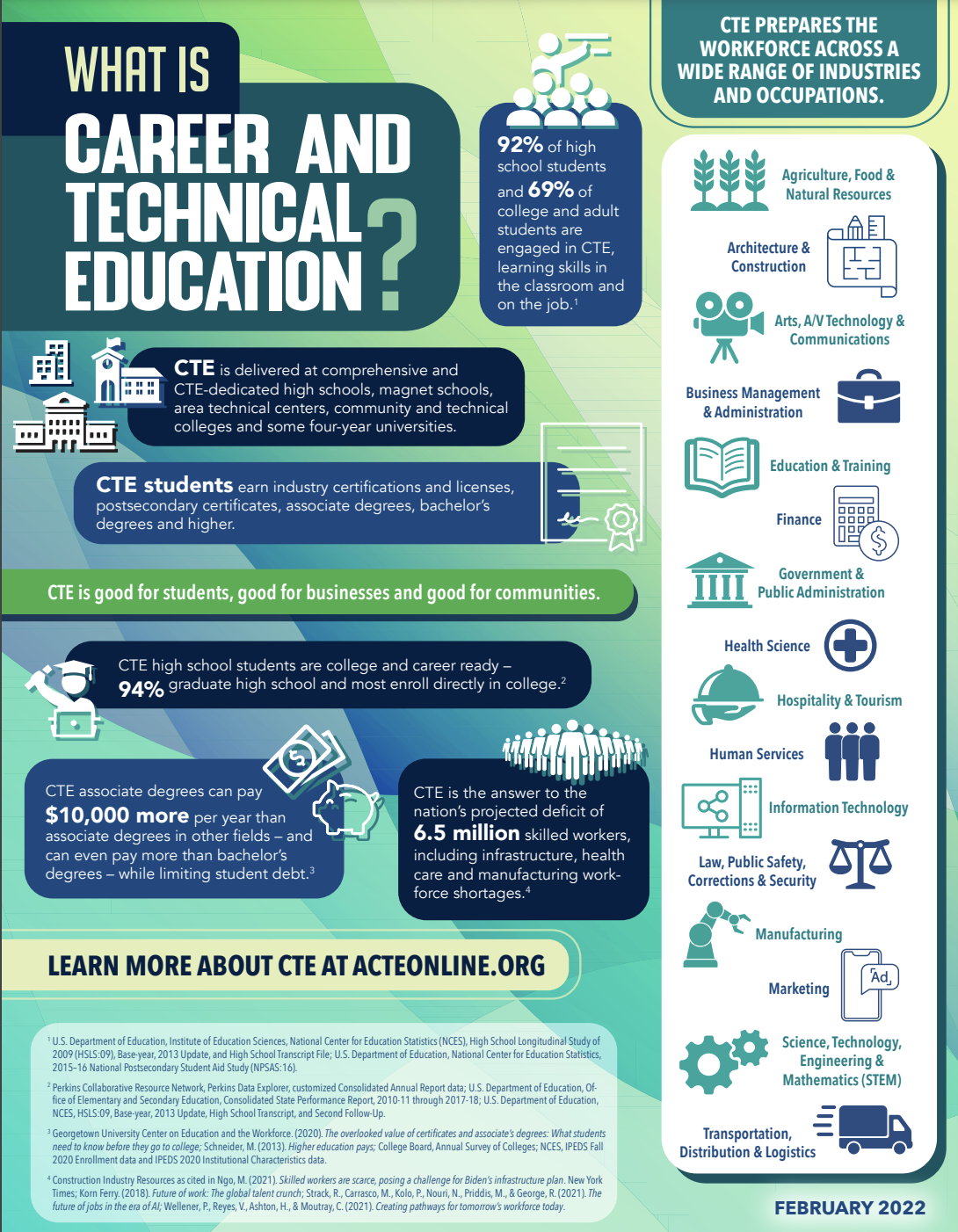
Download Infographic
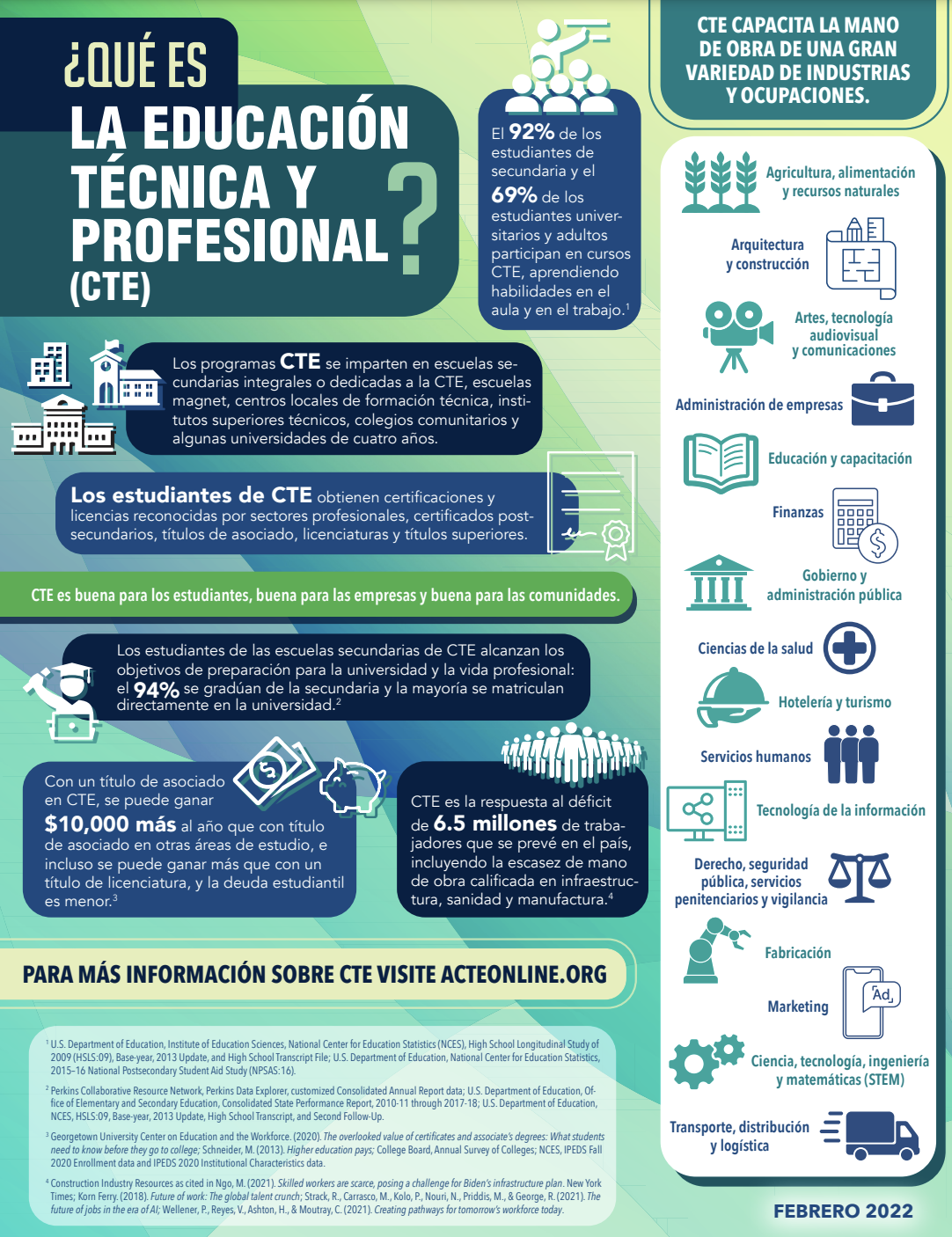
- ACTE’s Mission
- Get Involved
Press Center
- Press Releases
- CTE in the News
- State Fact Sheets
- Economic Impacts
Publications
- CTE Publications
- CTE Policy Watch Blog
- Take Action
- Advocacy Resources
ACTE® 1410 King Street, Alexandria, VA 22314 P: 800-826-9972 F: 703-683-7424
Professional Development
- ACTE Awards
- High-quality CTE Tools
- Leadership Development
- Online Learning
What we know about Career and Technical Education in high school
Subscribe to the center for economic security and opportunity newsletter, brian a. jacob brian a. jacob walter h. annenberg professor of education policy; professor of economics, and professor of education - university of michigan, former brookings expert.
October 5, 2017
- 17 min read
Career and technical education (CTE) has traditionally played an important role in U.S. secondary schools. The first federal law providing funding for vocational education was passed in 1917, even before education was compulsory in every state. 1
CTE encompasses a wide range of activities intended to simultaneously provide students with skills demanded in the labor market while preparing them for post-secondary degrees in technical fields. Activities include not only specific career-oriented classes, but also internships, apprenticeships and in-school programs designed to foster work readiness.
CTE advocates cite several goals of career-oriented learning experiences. For non-college-bound students, CTE can provide hands-on training that translates directly to attractive careers upon graduation. Work-related or internship-like experiences that are often a part of CTE can teach students the “soft skills” necessary in the labor market. Finally, by integrating academic skills into a “real world” context, advocates claim that CTE can motivate students to attend school more frequently and be more engaged, and therefore improve core academic skills.
However, CTE has been on the decline for several decades. Starting in the 1980s, states increased the number of courses required for high school graduation, and began mandating students take additional courses in core academic areas such as math, science, social studies and foreign language. 2 These additional requirements, along with declining funding 3 and a growing perception that all young people should be encouraged to obtain a four-year college degree, led to a sharp decline in CTE participation. Between 1990 and 2009, the number of CTE credits earned by U.S. high school students dropped by 14 percent. 4
The past decade has seen a resurgence in interest in CTE. Scholarship in the area of education and the labor market has increased markedly. 5 In the past four years alone, media mentions of “career and technical education” have quadrupled. 6 In 2015 alone, 39 states instituted 125 new laws, policies or regulations relating to CTE, many of which increased state funding for such programs. Montana, for example, doubled the annual statewide appropriation for secondary CTE; Nevada tripled its funding. 7
Unfortunately, research on CTE has not kept pace with policy interest. 8
What does earlier non-experimental research tell us?
Prior non-experimental evidence suggests that students who participate in secondary CTE programs have higher employment and earnings than demographically-similar peers in the short run, but they do not necessarily have better academic outcomes. For example, many studies show little or no differences between CTE participants and comparison groups in terms of academic achievement, high school graduation or college enrollment. 9
A good example of this type of research is a recent study by Daniel Kreisman and Kevin Stange, which relies on data from the NLSY97, a nationally representative sample of 12- to 17- year-old youth in 1997 that tracks individuals over time.
They find that CTE participation is not strongly associated with educational attainment – CTE students are marginally less likely to enroll in college but no less likely to earn a degree – but CTE coursework does predict employment outcomes. Importantly, they find that CTE participation is associated with higher wages, with the increase driven entirely by upper-level coursework, defined as courses within a sequence beyond the introductory class, in more technical fields. Each additional year of upper-level vocational coursework is associated with a nearly 2 percent wage increase. 10 This suggests that the benefits of CTE education stem from in-depth study of a specific area consistent with the recent trend toward “pathways of study” within CTE. 11
As the authors recognize, however, the biggest challenge in evaluating CTE is that students typically self-select into such programs, or student choices are circumscribed by the types of programs offered in nearby schools. In either case, it is likely that students participating in CTE are different in many ways than other youth who do not participate in CTE – in terms of their personal abilities and interests, family background, etc. On the one hand, many observers have described CTE as a “dumping ground” for lower-achieving or unmotivated students. 12 On the other hand, because CTE is not the “default” pathway, the students who participate must be at least somewhat motivated and informed. 13
CTE can motivate students to attend school more frequently and be more engaged, and therefore improve core academic skills.
Kreisman and Stange attempt to circumvent this selection problem using what researchers refer to as an instrumental variables strategy. Simply put, they compare students across schools with different high school graduation requirements because, as they show, the greater the number of required courses, the fewer CTE courses students take. Using this approach, they find that the wage benefits associated with CTE disappear.
However, a key assumption here is that, after controlling for observable student and school characteristics, the students attending high schools with fewer graduation requirements are identical to those attending high schools with more graduation requirements. 14 As the authors recognize, this is a very strong assumption. If this assumption is true, it implies that students whose CTE course-taking is influenced by graduation requirements realize little benefit from it. Of course, it may still be the case that those who self-select into CTE benefit from it, and that prohibiting them from doing so would be detrimental.
A further complication is that virtually all of the existing research on CTE has focused on relatively short-run outcomes. This is a notable limitation because many believe that career-focused education involves a tradeoff – namely, learning a narrower set of technical skills that can provide short-run benefits at the expense of learning more fundamental skills that will better serve individuals in the long-run. 15 Indeed, a recent study using European data finds some evidence of exactly this type of tradeoff. 16 Given the changes we expect to take place in the labor market in coming years, and how often individuals might need to switch occupations, this is a potentially serious concern. Of course, advocates of CTE argue – with some justification – that career-oriented education today does aim to teach core academic skills essential to lifelong learning, and often does so better than traditional schooling, particularly for disadvantaged youth. 17
the gold standard
The single best way to avoid such selection problems and determine the causal impact of a policy or program is through a randomized control trial. While such experiments can be expensive and are often logistically or politically difficult, they have a long history in education policy research. Other research designs, known as quasi-experimental research, attempt to approximate the same design with statistical techniques.
According to the What Works Clearinghouse, for example, there are 83 programs with experimental or quasi-experimental evidence in the area of early childhood education, 39 programs for dropout-prevention, and 32 programs for English language learners.
In the area of secondary CTE, there is only 1. Yes, one. This study examined Career Academies in the early 1990s, before many of the occupations common today even existed and prior to the introduction of policies with important implications for secondary schools (e.g., school accountability). 18
Structured as distinct programs embedded within comprehensive high schools, the Career Academies provided students with career-oriented instruction in a particular field along with internships and other activities to prepare students for, and connect them with, the labor market. The schools in the study were located in or near large urban areas with predominantly low-income minority student populations. The Career Academy programs were oversubscribed, which permitted admissions to be determined by lottery.
Researchers found that Career Academies had no impact (positive or negative) on high school graduation, postsecondary enrollment or educational attainment. However, the study found that students who received the opportunity to attend a career academy earned 11 percent more than the control group. Interestingly, this positive wage effect was driven entirely by male students, who enjoyed a 17 percent earnings boost. Males defined as high-risk based on baseline characteristics (i.e. prior to high school) realized the largest benefits from the program. There was no significant difference between the earnings of females in the treatment and control group.
This single study has been cited hundreds of times, and is featured prominently in nearly every literature review and many policy proposals regarding CTE. While this was an extremely well-done evaluation of an important CTE model, it has important limitations. As noted elsewhere, Career Academies are a small component of CTE provision nationwide. 19 The study itself focused on a small number of sites which, as evidenced by their oversubscription, were perceived as high quality. 20
and then there were two
Compelling research on CTE recently doubled with the release of a new study of regional vocational and technical high schools (RVTS) in Massachusetts. 21
Related Books
Elaine Kamarck, Darrell M. West
August 27, 2024
Robert Kagan
April 30, 2024
Daniel S. Hamilton, Joe Renouard
April 1, 2024
Unlike the Career Academies described above, RVTS are entire schools devoted to career-oriented instruction. Students spend one week in the classroom followed by one week in a technical shop. While students in other schools have access to CTE courses, RVTS offer more variety in terms of the program of study, and the programs themselves are typically higher quality than those found in comprehensive high schools.
The author of the study, Shaun Dougherty, obtained detailed data on student applications to three RVTS. Because the schools are often oversubscribed, they admit students on the basis of their attendance, grades and discipline record in middle school. By comparing the educational outcomes of students who scored just above the admissions threshold (and thus were very likely to attend) and just below the admissions threshold (who mostly did not attend), Dougherty is able to account for the selection bias that has plagued prior CTE research. This approach is known as a regression discontinuity design. What Works Clearinghouse considers well-done studies of this type to provide evidence nearly as compelling as an RCT.
Dougherty finds that attending a RVTS dramatically increases the likelihood of high school graduation. Poor students are 32 percentage points more likely to graduate if they attend a RVTS, which represents a 60 percent increase given the baseline graduation rate of 50 percent. The effect for non-poor students is somewhat smaller, but still quite large – an increase of 23 percentage points from a baseline of 67 percent, suggesting a nearly 35 percent improvement. 22 At the same time, Dougherty finds that attending a RVTS has no impact (positive or negative) on the standardized math and reading exams that all Massachusetts students take at the end of 10 th grade.
where to go from here?
More rigorous research on CTE programs is clearly needed. To its credit, the Institute for Education Sciences (IES) recently initiated several new data collection and research grants in this area. The recent study by Dougherty is a great start, but only a start. Further progress requires a series of studies that build on each other, and examine different approaches to CTE. Because states play a large role in developing and overseeing CTE programming, they must take the lead. States have been very active in passing laws, issuing regulations and disseminating policies about CTE. States now need to step up and support a research agenda that can help ensure these new initiatives are successful.
The author did not receive any financial support from any firm or person for this article or from any firm or person with a financial or political interest in this article. He is currently not an officer, director, or board member of any organization with an interest in this article.
- The Smith-Hughes Act of 1917 preceded the passage of compulsory attendance laws in Mississippi in 1918 , the last of the 48 states of the time to pass such a law.
- Jacob et al. (2017). “Are Expectations Alone Enough? Estimating the Effect of a Mandatory College-Prep Curriculum in Michigan.” Education Evaluation and Policy Analysis,39(2): 333-360. http://journals.sagepub.com/doi/full/10.3102/0162373716685823 .
- U.S. Department of Education (2014). National assessment of career and technical education. Final report to congress. Technical report, Washington, DC.
- Hudson, L. (2013). “Trends in CTE Coursetaking. data point.” National Center for Education Statistics, NCES 2014-901.
- Shaun M. Dougherty and Allison R. Lomarbardi. “From Vocational Education to Career Readiness: The Ongoing Work of Linking Education and the Labor Market.” Chapter 10 in Review of Research in Education, March 2016, Vol. 40: 326–355
- From 5,518 stories in 2014 to 22,755 stories from January 1 to September 28 of this year, based on author’s Meltwater analysis.
- http://www.acteonline.org/uploadedFiles/Who_We_Are/Press/2015_State-Policy-Review_FINAL%20(1).pdf
- Corinne Alfeld made this same point in an IES blog post earlier this year. See https://ies.ed.gov/blogs/research/post/career-technical-education-is-growing-research-must-follow
- For good reviews of this prior literature, see Kreisman and Stange (forthcoming) and Dougherty (forthcoming).
- The benefits of upper-level CTE coursework is driven largely by those focusing in technical fields.
- While selection bias is still a concern, it is worthwhile noting that the authors control for a very rich set of covariates including student demographics, parental income, parental education, student AFQT score, freshman year GPA, state of birth and various school characteristics.
- See, for example, Kelly, S. & Price, H. (2009). Vocational education: A clear slate for disengaged students? Social Science Research, 38 (4), 810–825.
- Insofar as CTE programs involve travel to/from worksites, it seems likely that participation requires more time than a student would have to devote to a standard high school track.
- As the authors discuss in detail in the paper, there are two reasons why their instrumental variable results might differ from their OLS regression results. The first is that the students who self-select into CTE have some positive, unobservable characteristics that explain their success in the labor market. The second is that there is true heterogeneity in the returns to CTE – the students who self-select do indeed benefit from the experience, but those whose course-taking decisions can be swayed by their school’s graduation requirements do not benefit.
- http://hanushek.stanford.edu/publications/german-style-apprenticeships-simply-cant-be-replicated
- Among younger people, employment rates are higher among those with vocational education. However, this pattern reverses by age 50. These patterns are most pronounced in countries that have highly developed work-based education systems such as Germany, Denmark and Switzerland. See Hanushek et al. (2017). “General Education, Vocational Education, and Labor-Market Outcomes over the Life-Cycle.” Journal of Human Resources. 52(1): 49-88.
- http://blogs.edweek.org/edweek/top_performers/2017/07/the_false_choice_between_vocational_and_academic_education.html
- Kemple, J & Willner, C.J. (2008). Career academies: Long-term impacts on labor market outcomes, educational attainment, and transitions to adulthood . MDRC.
- Kreisman and Stange (2016), “Vocational and Career Tech Education in American High Schools: The Value of Depth Over Breadth.” NBER working paper
- And, if one looks beyond the headline results, the detailed findings of the Career Academy raise a number of important questions about the mechanisms, and thus generalizability, of the impacts. For example, students in the treatment group reported significantly higher levels of interpersonal support from teachers and peers than their comparison counterparts. While Career Academy students did engage in work-based experiences that control students did not, researchers found that the curricula and instructional materials used in the Career Academies were similar to those used in other parts of the high school, and did not meaningfully integrate academic content with career-related applications. Together these findings suggest that the benefits of attending a career academy may relate as much to the school culture as the particular career focus, similar to the benefits of attending a small school or “school-within-a-school.”Bloom, Howard S., and Rebecca Unterman. 2014. Can small high schools of choice improve educational prospects for disadvantaged students? Journal of Policy Analysis and Management 33(2): 290–319.
- Dougherty, S.M. (forthcoming). “The Effect of Career and Technical Education on Human Capital Accumulation: Causal Evidence from Massachusetts.” Education Finance & Policy.
- These findings are consistent with some prior research suggesting that CTE participation can increase attachment to school. See, for example, the following studies: Plank, Stephen B., Stefanie DeLuca, and Angela Estacion. 2008. High school dropout and the role of career and technical education: A survival analysis of surviving high school. Sociology of Education 81(4): 345–370. Cellini, Stephanie Riegg, “Smoothing the Transition to College? The Effect of Tech-Prep Programs on Educational Attainment,” Economics of Education Review, 25(4), August 2006: 394-411.
K-12 Education
Economic Studies
Center for Economic Security and Opportunity
Sopiko Beriashvili, Michael Trucano
April 26, 2024
Richard V. Reeves, Ember Smith
Michael Trucano, Sopiko Beriashvili
April 25, 2024
Created by the Great Schools Partnership , the GLOSSARY OF EDUCATION REFORM is a comprehensive online resource that describes widely used school-improvement terms, concepts, and strategies for journalists, parents, and community members. | Learn more »

Career and Technical Education
Career and technical education is a term applied to schools, institutions, and educational programs that specialize in the skilled trades, applied sciences, modern technologies, and career preparation. It was formerly (and is still commonly) called vocational education ; however, the term has fallen out of favor with most educators.
Career and technical programs frequently offer both academic and career-oriented courses, and many provide students with the opportunity to gain work experience through internships, job shadowing, on-the-job training, and industry-certification opportunities. Career and technical programs—depending on their size, configuration, location, and mission—provide a wide range of learning experiences spanning many different career tracks, fields, and industries, from skilled trades such as automotive technology, construction, plumbing, or electrical contracting to fields as diverse as agriculture, architecture, culinary arts, fashion design, filmmaking, forestry, engineering, healthcare, personal training, robotics, or veterinary medicine.
Career and technical education may be offered in middle schools and high schools or through community colleges and other postsecondary institutions and certification programs. At the secondary level, career and technical education is often provided by regional centers that serve students from multiple schools or districts. For example, the Boards of Cooperative Educational Services in New York administers a network of 37 regional career and technical education centers that serve students throughout the state. Many states have similar regional centers or statewide networks that operate as part of the public-school system.
In some cases, career and technical education is provided through a high school, where it may or may not be an integrated part of the school’s regular academic program. Students may also attend separate career and technical institutions for part of the school day, or a regional center may be the primary school of enrollment, where students take both academic and career and technical courses. In other cases, career and technical programs may take the form of a distinct “school within a school,” such as a theme-based academy , that offers an interdisciplinary or career-oriented program in which academic coursework is aligned with specific career paths, such as culinary arts, nursing, or engineering.
Some educators and school-reform advocates argue that career and technical education is an underutilized learning pathway that could help to increase the educational engagement, achievement, and attainment of students who are not excelling in more traditional academic programs. The practical learning experiences that are often provided in career and technical programs appeal to many students, and certain common elements—the focus on critical thinking, new technologies, real-world settings, hands-on activities, and the application of learning to practical problems, for example—align with a growing emphasis on 21 st century skills —skills that are relevant to all academic subject areas and that can be applied in educational, career, and civic contexts throughout a student’s life. Advocates may also argue that career and technical education programs are an antidote to some of the weaknesses of traditional academic programs. For example, rather than learning from books, taking tests, and discussing abstract concepts in classrooms, students gain practical, relevant, marketable skills that will them more employable adults after graduation.
Over the past few decades, learning expectations for career and technical education have risen significantly, largely in response to the increasing sophistication of modern careers that are demanding higher levels of education, training, and skill from the workforce. For instance, yesterday’s “auto mechanics” are today’s “automotive technicians,” and automotive programs now routinely provide training in the use of advanced computerized diagnostic equipment in addition to more traditional mechanical repairs. Students enrolled at career and technical centers, which are typically secondary-level public schools, are required to meet the same learning standards that apply to students in public high schools. In addition to state-required learning standards that apply to public schools, many states have developed standards specific to career and technical programs.
In the United States, career and technical education is often stigmatized, and there is a widespread perception that career and technical centers provide a lower quality education or that students who attend such schools are less capable or have lower aspirations. At least in part, these perceptions are lingering stereotypes associated with traditional “vocational” programs of past decades. There is no concrete evidence that such generalized perceptions and stereotypes are valid, and many studies have shown that students enrolled in career and technical programs can and do outperform students in more traditional academic settings.
Discussions about career and technical education also intersect with ongoing debates about academic “tracking,” or the sorting of students into tiered courses based on past academic performance or perceived ability. Depending on its structure, academic requirements, and student demographics, a career and technical program can resemble an academic track in that certain types of students or certain educational outcomes may predominate. For example, lower-income students and minorities may be disproportionately represented in a program, or graduation rates and college-going rates may be markedly lower. Critics of tracking may argue that such results more than likely reflect the particular structure and culture the education system , rather than an accurate representation of the abilities and aspirations of the students enrolled in the programs.

Alphabetical Search

Applying to UW-Stout

Academic Programs & Courses

Dive Into Campus Life

Elevate Your Business

Our Polytechnic Advantage
B.s. career, technical education & training online, make a difference teaching technical education..
UW-Stout's Bachelor of Science (B.S) in Career, Technical Education & Training is a degree completion program designed for working adults who aspire to teach in a technical or community college setting. This program provides instructors and non-instructors the opportunity to articulate an Associate’s Degree or Technical Diploma to a Bachelor's Degree by expanding their technical knowledge to include expertise in instruction, leadership, course construction, and evaluation.
100% of Graduates Are Employed or Continuing Education.
Career-Defining Curriculum
Our curriculum prepares you to teach in post-high school settings, such as technical and community colleges and training programs in business and industry. Graduates have gone on to teach in such diverse subject areas as automotive technology, diesel technology, building construction, culinary arts, machine tool, drafting, dental assistant, and many more.
Program Overview
View program plans, credit requirements and course descriptions.
Program Highlights
- Transfer-friendly degree
- Discipline-focused curriculum
- Option to earn a specialization in Training and Human Resource Development
- Maximum transferability of college credits from most technical and community colleges
- Credit for prior learning options available
- Financial aid options available
- Faculty with business and industry experience
This convenient online program allows students to complete their bachelor's degree in as little as two years with year-round registration.
Use the Request Information form to receive a program summary and learn more about the program.
Request Information
Tuition & fees.
Customized Instruction at UW Stout can be described as programs that are designed with the adult learner in mind. If you're comparing UW-Stout's online degree customized instruction (CI) tuition to our competitors, keep in mind:
- Customized instruction tuition rate includes the textbook rental fee.
- There are no additional university-based semester or technology fees.
- Students in customized instruction programs pay the same rate of tuition regardless if Wisconsin residents, out-of-state or international participants.
Value for Your Money
There’s more to value than just tuition. UW Stout also provides:
- Program Director – faculty with discipline expertise.
- Student Services adviser – one point of contact, providing support to students for each program.
- Course sequences and matrices – know what courses are offered when so you can plan ahead.
- Courses and programs may be stackable for use in another program.
- Courses are flexible and convenient for working professionals.
Other universities will present costs and value differently - make sure you're comparing apples to apples.
Advisory Committee Members
Career, technical education & training.

School of Education impacts field of teacher education, develops instrument adapted by national colleagues

Graduate’s long journey toward bachelor’s degree ends at Dec. 18 commencement
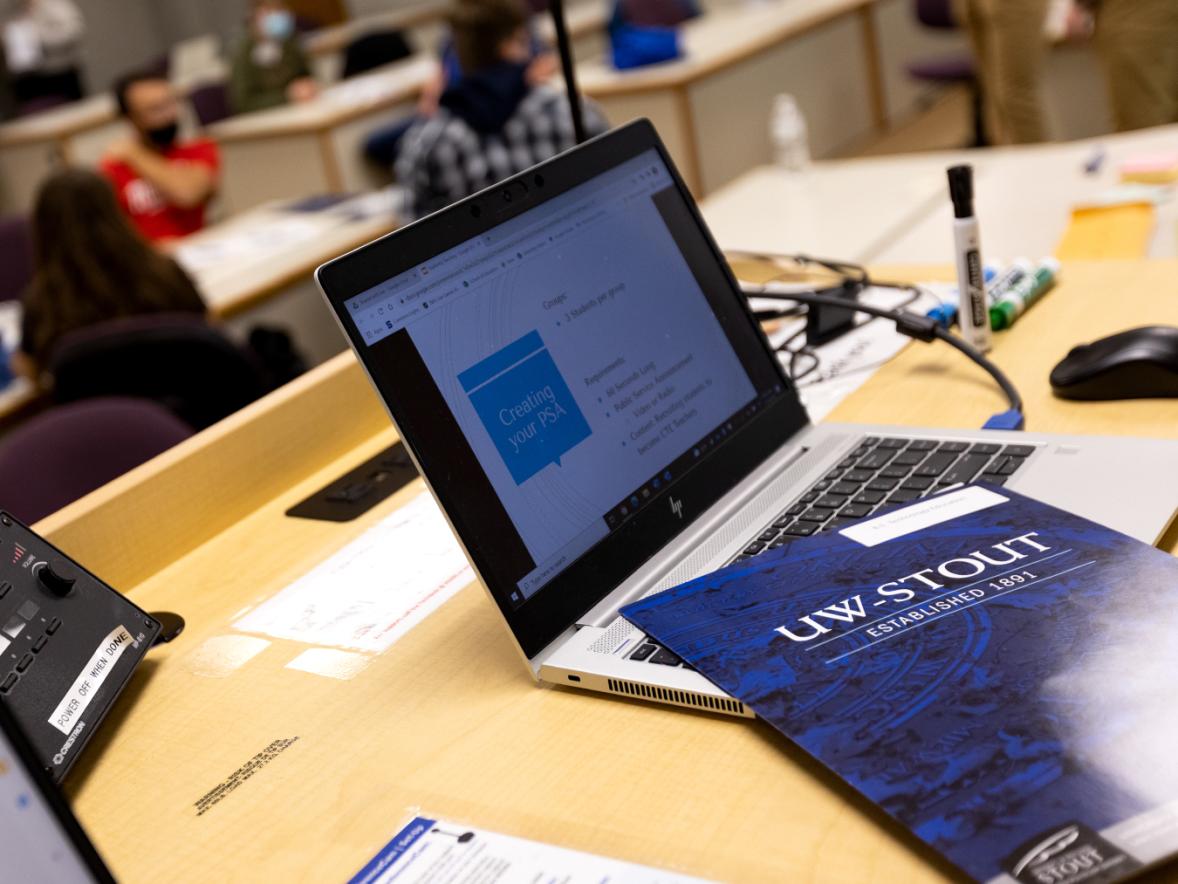
Teach Day encourages high school students to explore teaching career
Explore similar programs.
- B.S. Art Education
- B.S. Special Education
- B.S. Family & Consumer Sciences Education
- B.S. Early Childhood Education
- B.S. Marketing & Business Education
- B.S. Technology Education
- B.S. Graphic Communications
- M.S. Education
- M.S. Career & Technical Education
- M.S. School Counseling
- M.S.Ed. & Ed.S. School Psychology
- Ed.D. Career & Technical Education Leadership Online
- Teaching Adult Learners Certificate
A Guide to Trade Schools and Vocational Programs
Career and technical education can be an alternative to, or a supplement for, a bachelor's degree.
A Guide to Trade Schools

Getty Images
Many of these programs are open to anyone who wishes to attend.
For Ty'Relle Stephens, making a beeline from high school to a bachelor's program didn't feel like the right choice, even though many people encouraged him to go straight to college.
"I didn't think that I was ready for college at 18," Stephens says.
Though he did eventually plan to pursue a bachelor's degree, Stephens wanted to get work experience and gain clarity about his life goals first, and he also hoped to bolster his abilities in areas like project management and public speaking. So he pursued a business operations certificate through Year Up, a tuition-free job training program with multiple campuses across the U.S.
High school seniors who want to enter the workforce as soon as possible after they graduate often choose to obtain career and technical certifications or earn occupational licenses in skilled trades like cosmetology, massage therapy or plumbing.
Completing a postsecondary vocational program doesn't prevent someone from eventually obtaining a bachelor's. Stephens – who recently became the youngest-ever elected school board member in Providence, Rhode Island – says his completion of the Year Up program prepared him to pursue a bachelor's degree in organizational leadership. He plans to get his bachelor's at College Unbound, a nonprofit undergraduate institution that specializes in educating nontraditional students.
According to Rachel Unruh, chief of external affairs for the National Skills Coalition, a nonprofit organization that focuses on workforce training, there's a prevalent misconception that the only way for a person to make a decent living is by getting a bachelor's degree. "It's sort of cut people off from considering, 'What kinds of jobs are out there that I could really be happy in that fit my interests and that don't require a four-year degree?'" she says.
Individuals with an associate degree, some college education or a high school diploma sometimes earn salaries above the norm for bachelor's degree recipients. This is most common within technical occupations, such as computer and mathematical fields, according to a 2021 research report from the Georgetown University Center on Education and the Workforce in the District of Columbia.
What Is a Trade School?
Though one colloquial term for a career-oriented learning institution is "trade school," umbrella terms like "career and technical college" and "vocational school" are more commonly used these days, in part to connote rigor.
"There have been significant advances in quality and rigor in career and technical education programs over time as needed by the labor market," says Alisha Hyslop, senior director of public policy at the Association for Career and Technical Education, or ACTE.
Career and technical colleges specialize in providing practical guidance on how to perform the day-to-day duties of a certain field, such as automotive mechanics.
"We are very career-focused. We are very hands-on," says Rose VanAlstine, director of campus administration at the Fort Worth, Texas, campus of Remington College, a nonprofit academic institution that offers a variety of vocational programs, including one on heating, ventilation and air conditioning. "Usually our programs are a lot shorter than a traditional community college or a four-year college, so the student is able to get the skills and the training that they need and get into the workforce rather quickly so they can support themselves and their family."
Vocational certification or licensure programs are often provided by community colleges, and some are sponsored by for-profit companies or private nonprofit organizations. Many of these programs are open to anyone who wishes to attend. This is different from four-year bachelor's programs, which often turn away applicants.
Vocational credentials are typically less costly than a bachelor's. However, vocational classes are often demanding and require precision, Unruh says.
"The idea that it's sort of the second chance path or it's what you do if you can't do college – I think that is really starting to shift," Unruh says, noting that the student loan debt crisis has made many people dubious about the market value of certain four-year undergrad programs.
Well-Paying Jobs That Don't Require a Bachelor's
People who have in-demand training within growing industries can sometimes earn more than $60,000 in positions that don't require a bachelor's , according to the U.S. Bureau of Labor Statistics. Here are a few examples of those roles, plus the median yearly U.S. compensation for those occupations as of May 2020:
- Air traffic controller: $130,420
- Aerospace technologist or technician: $68,570
- Court reporter or simultaneous captioner: $61,660
- Electronics installer and repairer: $62,020
- Fire inspector: $62,120
- Nuclear technician: $84,190
- Occupational therapy assistant: $60,950
- Theatrical and performance makeup artist: $106,920
How to Choose a Vocational Program
Potential vocational students should investigate student completion rates and job attainment statistics at the programs they are evaluating and whether they have appropriate accreditation, Hyslop says.
"Make sure you're not going to go through this program and then not be eligible to earn the credential that you need to work," she says.
Also, check on whether a vocational school's curriculum has been updated recently, whether employers sometimes serve as guest speakers and whether students have project-based learning opportunities, Hyslop says.
25 Best Jobs for High School Graduates

Tags: trade , community colleges , students , education
2024 Best Colleges

Search for your perfect fit with the U.S. News rankings of colleges and universities.
College Admissions: Get a Step Ahead!
Sign up to receive the latest updates from U.S. News & World Report and our trusted partners and sponsors. By clicking submit, you are agreeing to our Terms and Conditions & Privacy Policy .
Ask an Alum: Making the Most Out of College
You May Also Like
Find a job in the age of ai.
Angie Kamath April 25, 2024

Protests Boil Over on College Campuses
Lauren Camera April 22, 2024

Supporting Low-Income College Applicants
Shavar Jeffries April 16, 2024

Supporting Black Women in Higher Ed
Zainab Okolo April 15, 2024

Law Schools With the Highest LSATs
Ilana Kowarski and Cole Claybourn April 11, 2024

Today NAIA, Tomorrow Title IX?
Lauren Camera April 9, 2024

Grad School Housing Options
Anayat Durrani April 9, 2024

How to Decide if an MBA Is Worth it
Sarah Wood March 27, 2024

What to Wear to a Graduation
LaMont Jones, Jr. March 27, 2024

FAFSA Delays Alarm Families, Colleges
Sarah Wood March 25, 2024

Best Technical Courses
Advance your career with simplilearn’s technical courses.
Simplilearn’s technical courses cover in-demand skills and technologies. Excel in fields such as data science, cybersecurity, cloud computing, digital marketing, and software development with expert-led training and hands-on projects.
Our Program Partners :
Our Most PopularTechnical Courses
Explore our Technical Courses and take the first step towards career success
Python Training
Aligned to Python
24x7 learner assistance and support

Java Certification Training
Aligned to Java
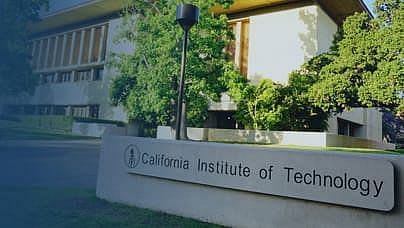
Post Graduate Program in Full Stack Web Development
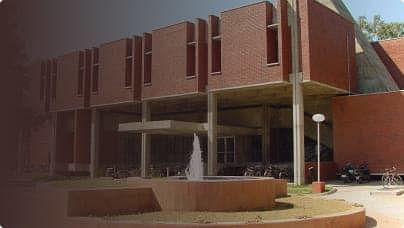
Professional Certificate Program in Blockchain
Post graduate program in cloud computing, automation test engineer.
15 tools & 1 Industry Projects
Master's certificate
In collaboration with IBM
Full Stack Java Developer
21 tools & 4 Industry Projects
Cloud Architect
20 tools & Rigorous curriculum
AWS Solutions Architect
Certification Aligned to AWS
Lifetime access to 50 hours of e-learning content
16 live demos of AWS services
Caltech Post Graduate Program in Data Science
Ceh (v12)- certified ethical hacker.
Accredited by EC-Council
CISSP ® - Certified Information Systems Security Professional
Aligned to CISSP
Batches in alignment with the new version

Post Graduate Program in Cyber Security
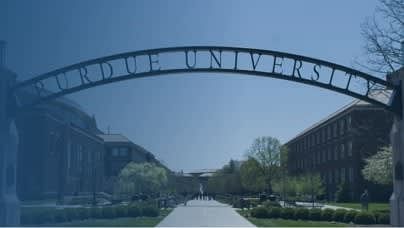
Post Graduate Program in Data Engineering
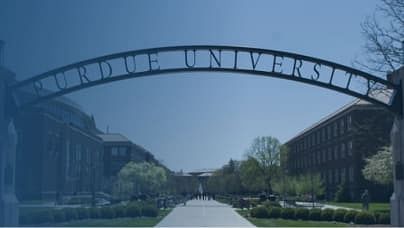
Post Graduate Program in Data Science
Post graduate program in devops, our technical courses duration and fees.
Technical certifications typically range from a few weeks to several months, with fees varying based on program and institution.
Need help finding your Program
Technical courses advisors.
Dave Todaro
Dave Todaro is a software visionary, entrepreneur, and agile project management expert. Dave has taught agile software development techniques to thousands of people worldwide and regularly advises companies on a wide range of product strategy and software engineering topics.
Patrick J. Wolfe
Patrick J. Wolfe, an award-winning researcher in the mathematical foundations of data science, is the Frederick L. Hovde Dean of the College of Science at Purdue University and was named the 2018 Distinguished Lecturer in Data Science by the IEEE.
Rick Hefner
Dr. Rick Hefner serves as the Executive Director for Caltech’s CTME, where he develops customized training programs for technology-driven organizations. He has over 40 years of experience in systems development and has served in academic, industrial, and research positions.
Technical Course Learner's Reviews

The prevalence of big data in business decisions makes this a valuable course for working professionals and executives. This comprehensive online boot camp curriculum includes Business Intelligence/ Data Analytics, Natural Language Processing, Business Analytics, Deep Learning, and Data Engineering.

Brad Vincent
This is an excellent course, and the instructor is highly experienced and knowledgeable. I am happy with the course material and feel more comfortable with Tableau now.

Robert Briggs
I had great training sessions with a skilled instructor who covered concepts thoroughly and effectively. He presented complex concepts very clearly and provided ample practice time.

The instructor was clear, and I had a great learning experience. The training sessions were engaging, and insightful questions were asked. I liked the course curriculum. Thank you.
Jorge Barboza
After three weeks of finishing my course, I got hired as a cloud engineer. I changed my domain, and my salary just doubled. I got the job because I learned Azure during the course.
Andrea Mydosh
This course has a comprehensive curriculum which helped me gain a deeper understanding of the domain. The learning model delivered by industry experts along with 24 x 7 Learning support, practice labs, and flexible schedules made it very effective.
This course has a comprehensive curriculum which helped me gain a deeper understanding of the domain. The blended learning model delivered by industry experts along with 24 x 7 Learning support, practice labs, and flexible schedules made it the best coding bootcamp.
Craig Wilding
My instructor was experienced and knowledgeable with broad industry exposure. He delivered content in a way which is easy to consume. Thank you!
Merid Belayneh
I had a wonderful learning experience. The lectures were great and engaging. I am now looking forward to getting opportunities in the data science field.
Joseph (Zhiyu) Jiang
I completed Simplilearn's Post-Graduate Program in Data Engineering, with Purdue University. I gained knowledge on critical topics like the Hadoop framework, Data Processing using Spark, Data Pipelines with Kafka, Big Data and more. The live sessions, industry projects, masterclasses, and IBM hackathons were very useful.
David Nkengafac
Before starting the course, I did have a doubt whether I’d be able to keep up. But, this cloud computing certification course is designed very well and learners at all levels of experience and expertise can follow the content with ease. Apart from the content being very interesting, you also get to learn so much from your fellow learners.
Rogelio Lotho
My experience with Simplilearn was great. The curriculum is excellent, and the video lessons are incredible. The curriculum and course content is very relevant to the industry currently. The instructors were also very knowledgeable and helpful.
Cristian Hernández
The instructor is highly knowledgeable and organized. His teaching methodology is commendable. The training sessions are great and informative.
Thomas McManus
The instructor is exceptionally knowledgeable. Capstone nicely wraps up what we've been trained in the previous seven courses, and I feel more comfortable handling data analysis now. I look forward to bringing my newly obtained data scientist skillset to my job.

Magdalena Szarafin
My decision to upskill myself in data science from Simplilearn was a great choice. After completing my course, I was assigned many new projects to work on in my desired field of Data Analytics.
FAQs On Technical Courses Courses
What are the top technical courses to consider in 2023.
While some budding technology professionals start their careers right after graduation, others continue their post-college education by completing one or more technical courses first. As technology is continuously evolving, there's always something new and exciting to pursue in this growing and lucrative field. In fact, you’ll likely find that to maintain relevant and cutting edge skills—which translates into career success—you’ll probably need to seek out formal training at some point.
Whether you recently graduated from high school and are considering a technical course or you just earned a college degree and want something more specific to add to your resume, the courses below can help get you there.
What are the Top Technical Courses in India?
If you graduated with a technology-related bachelor’s degree in India, you'd most likely want to specialize in finding your niche in the job market. One possible focus is mobile applications, one of the fastest-growing tech sectors in India and around the world. Simplilearn’s Social, Mobile, Analytics, and Cloud Certification Training takes a deep dive into this exciting sector.
Which are some of the top Technical Courses in the UK?
If you want to get certified in the United Kingdom in data science, which is poised for tremendous growth, Simplilearn’s Master’s Program in Data Science will give you a solid foundation for your career. You’ll get practical training in the leading tools and methods used in data science, including Spark, Hadoop, Python, Tableau, R, and SAS.
Which are the Top Technical Courses in Australia?
In Australia, post-graduate training is known as Technical And Further Education, or TAFE. Companies throughout Australia recognize the experience and training that is gained through these types of courses, whether completed online, in-person or through a combination of the two. Simplilearn’s Data Science Course in Melbourne , Australia, is an excellent option for those in the state of Victoria.
What are some good options among the Top Technical Courses in Singapore?
Singapore is a major technology hub, so it’s not surprising that there are many great options for those pursuing continuing education in a given technology sector. Several schools offer professional degrees in computer science, along with a variety of online options. Singapore’s specific needs in terms of professional skills include artificial intelligence and cybersecurity (see Simplilearn’s Certified Ethical Hacker Certification ).
Should I enroll in the Top Technical Courses in UAE?
Yes. The United Arab Emirates, or UAE, is booming with opportunities for graduates looking to pursue a technical education. This is particularly evident in Dubai, with both on-campus and online learning options available. Dubai is considered a hub of artificial intelligence and machine learning. So, enroll in the best technical courses available in the UAE today. Simplilearn’s AI and ML Certification is a great way to jumpstart your career in this exciting tech sector.
What are Top Big Data related Technical Courses in the US?
Simplilearn offers short-term technical courses online in the US on Big Data related technologies that teach hands on skills and offer certification upon completion. Here's a partial list of the best Big Data related technical courses in the US available through Simplilearn technical certificate programs:
1. Big Data Engineer Master's Program Co-developed with IBM, this data engineer course teaches students a range of skills needed to succeed as a big data engineer. More specifically, students learn the Apache Spark in Python programming language, the MongoDB database app, and Hadoop and Big Data frameworks.
2. Big Data Hadoop Certification Training Course In addition to providing an in-depth look at the Hadoop framework, this Hadoop admin course prepares students for the Cloudera CCA Spark and Hadoop Developer Exam (CCA175).
Which Top Data Science related Technical Courses in the US provide the best career options?
The best ranked Data Science related technical courses in the US are listed below:
1. Data Scientist Master's Program Through this data science course, also co-developed with IBM, students can put their skills to the test through more than 15 real-life projects, plus a capstone project, as a way to offer hands-on industry training. 2. Data Analyst Master’s Program Students learn analytics from the ground up in this data analytics course, which includes lessons on SQL databases and other data analysis tools. Through the program, also co-created with IBM, students can learn programming languages like Python and R.
3. Data Science with Python Training Course Participants learn both data science and analytics in this Python for a data science course, which focuses on the Python programming language. Students can complete data science certification training through this program to advance in their careers.
4. Data Science with R Certification Training Similar to Data Science with Python Training, this course focuses on programming but instead teaches the R language. While it can be taken on its own, the training pairs well with the Python course for a more well-rounded experience.
Which are the Top Artificial Intelligence related Technical Courses in the US to enroll in 2023?
The most sought after AI courses in the US are:
Caltech Artificial Intelligence Course Students can master deep learning in this Caltech AI ML Program, which was created specifically for those pursuing artificial intelligence, or AI, careers. It also includes lessons in machine learning and various programming languages.
AI and ML Certification Also ideal for those aspiring to work in AI, this program focuses on machine learning and how specific techniques are used throughout the AI world.
Which is the best entry-level Cyber Security Technical Course in the US?
The Certified Ethical Hacking Course — CEH (v10) course offered by SImplilearn is the best entry-level cyber security course in the US. In this ethical hacking course, students use various methodologies to safeguard networks against hackers by thinking like them.
What are the best software certification courses in the US?
Here is a list of the best technical coursesin the US that provide hands on training in advanced software technologies:
1. Angular Training Course Students looking to succeed in front-end web development can learn various Angular concepts in this course, including Pipes, Directives, and TypeScript.
2. Selenium Training Course This comprehensive training course helps students master Selenium 3.0. It covers AutoIT, Wait, TestNG, and many other tools and concepts.
3. Java Certification Training Course Students can better understand the Java programming language in this course, which also includes certification training prep. In addition to the fundamentals, students learn advanced techniques like Java EE and Java 8. 4. Node.js Training Course participants learn how to develop web applications efficiently through this training, which also teaches JavaScript and other programming skills.
5. Salesforce Administrator & App Builder Certification Training Students learn how to build apps and become top-performing administrators in this course, which also includes hands-on practice with Salesforce Lightning, the company’s latest version.
6. Salesforce Administrator Certification Training Course
Building upon the Salesforce Administrator & App Builder training is this course, which focuses entirely on administration. Students learn how to manage sales and service clouds, as well as troubleshoot user interfaces.
What are the benefits of enrolling in technical courses?
You can fine-tune your career pursuits with learning solutions at any stage of your professional life with online technical courses. No matter where you are in your education level and training, you can find a course that aligns with your professional goals. In many cases, you can also experience the flexibility that comes with an IT job. Whether you are looking for the top technical courses in the United States, UK, Australia, Singapore, or UAE, you can find one that works for you by researching these options. Enroll in one of SImplilearn’s technical courses today to take your career to the next level!
Recommended Resources
Free masterclass.
How to Use ChatGPT & Excel For Data Analytics in 2024
Unlock Your Data Game with Generative AI Techniques in 2024
Build a Recession-Proof Cloud Career for 2024 with Caltech PGP Cloud Computing
How 2024's Cyber Attacks Are Boosting the Cyber Job Market?
Open Gates to a Successful AI & Data Science Career in 2024 with Brown University
Climb the Career Ladder with UMass Post Graduate Program in Lean Six Sigma
Mean Stack vs MERN Stack: Which Tech Stack to Choose in 2024?
Scale the Heights to Cybersecurity Excellence with Caltech Cyber Security Bootcamp
Free online courses, business analytics with excel.

Earn up to $139K
Completion Certificate
Win reward when you enrol
Python for Beginners

Earn up to $130K
Introduction to Data Analytics Course

Introduction to Cyber Security

Earn up to $113K
Introduction to MS Excel

Power BI for Beginners

Introduction to SQL

Introduction to Front End Development

Blockchain Developer

Earn up to $110K
JavaScript for Beginners

Earn up to $155K
Introduction to Cloud Computing

Introduction to Data Science

Excel Dashboard for Beginners

Programming with Python 3.X

Introduction to IoT

Earn up to $141K
Articles & Tutorials
20 Most Popular Programming Languages to Learn in 2024
Blockchain Tutorial for Beginners
List to String in Python
Microsoft Azure Tutorial for Beginners
Java Tutorial for Beginners
C++ Tutorial for Beginner
AWS Tutorial for Beginners: A Step-by-Step Guide
Top 40 Coding Interview Questions You Should Know
Top 50+ Salesforce Interview Questions and Answers for 2024
Bitcoin Mining Explained
Top 75 Manual Testing Interview Questions and Answers for 2024
The Ultimate Guide to Understand Int to String in C++
ReactJS Tutorial: A Step-by-Step Guide To Learn React
Cloud Computing Tutorial for Beginners
C Program for Bubble Sort to Sort Elements in an Order
Explore other related technical courses courses.
- PMP, PMI, PMBOK, CAPM, PgMP, PfMP, ACP, PBA, RMP, SP, and OPM3 are registered marks of the Project Management Institute, Inc.
- Grades 6-12
- School Leaders
Learn How to Support Stressed and Anxious Students.
What Is Career and Technical Education (CTE) in Schools?
Equip students with practical skills for their future careers.
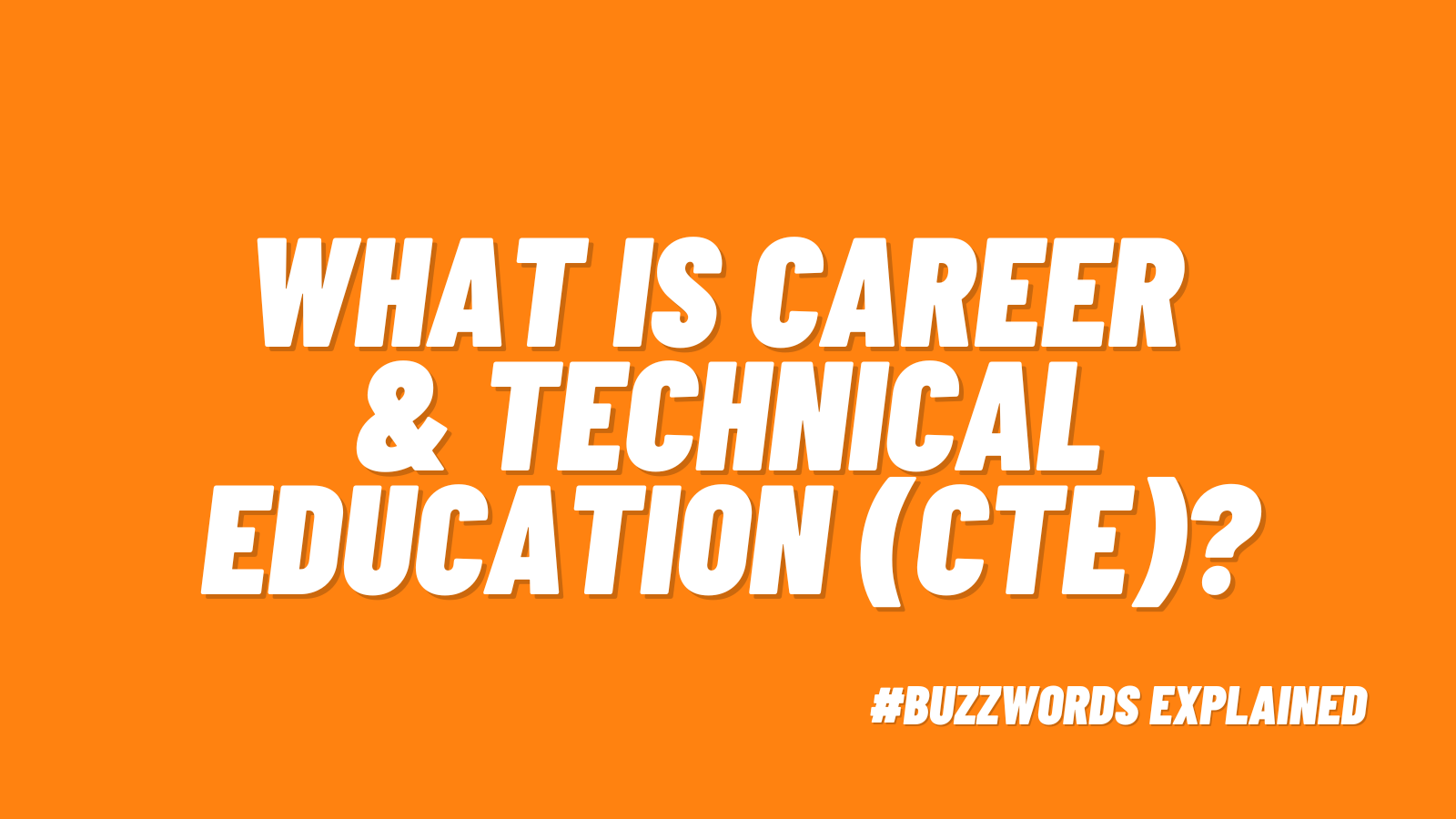
A college education is an admirable goal, and it’s a must-have for certain careers these days. But there are plenty of terrific skilled jobs that don’t require a four-year degree, and it’s important to provide today’s students with multiple options so they can find the right fit. For many, that includes career and technical education (CTE). Here’s what that term means, and why it’s such an important option.
What is career and technical education (CTE)?
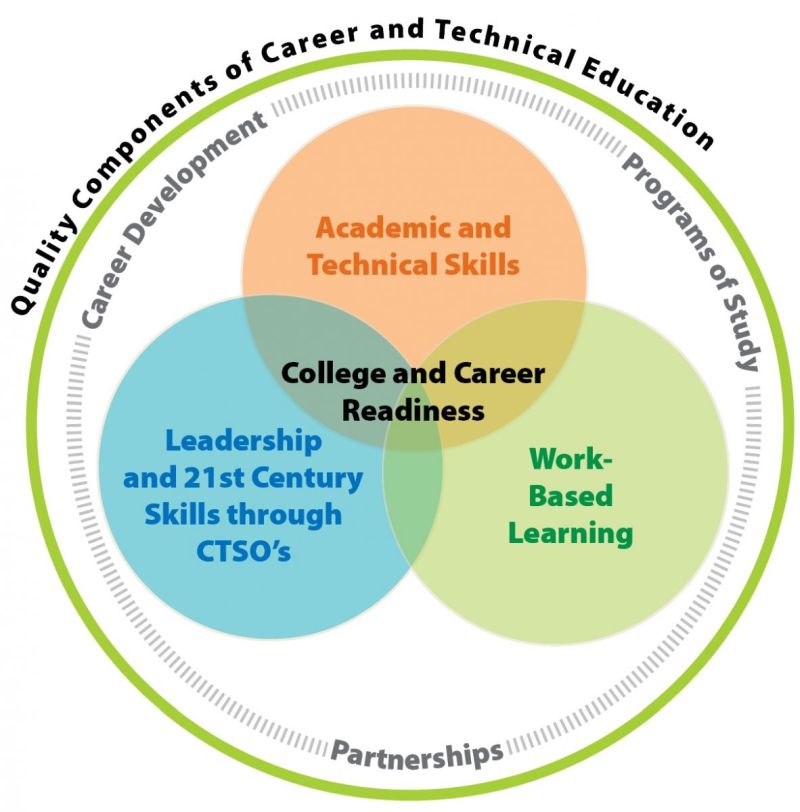
Simply put, career and technical education (CTE) provides students with the specific training and skills they need for a wide variety of careers that don’t require a traditional college degree. These include skilled trades jobs, health and medical technicians, service and hospitality industries, and more. CTE can begin as early as middle school and continue through high school into post-secondary education.
Unlike a traditional college education, which focuses more on knowledge and theory, CTE aims to help students develop practical skills. It includes much more hands-on experience, both in the classroom and out. Students may earn certifications they need to qualify for jobs, while building a background of experience that will help them get hired.
The length of a CTE course varies, but it is usually much less than a four-year college degree. The costs are also usually far lower, meaning students are ready to enter the workforce sooner and with less potential debt. Depending on the field and their location, students may even be able to receive career and technical education for free as part of their K-12 public school education.
Find out more about career and technical education from Advance CTE.
The National Career Clusters Framework organizes CTE fields in 16 clusters covering nearly 80 different careers:
- Agriculture, Food & Natural Resources
- Architecture & Construction
- Arts, A/V Technology & Communications
- Business Management & Administration
- Education & Training
- Government & Public Administration
- Health Science
- Hospitality & Tourism
- Human Services
- Information Technology
- Law, Public Safety, Corrections & Security
- Manufacturing
- Science, Technology, Engineering & Mathematics
- Transportation, Distribution & Logistics
See the careers included in each CTE cluster here.
Why is CTE important?
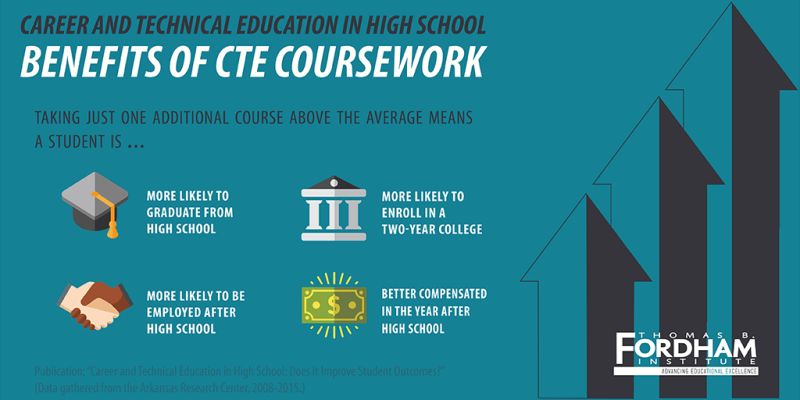
In the past, people learned trade skills on the job in apprenticeships or other training programs while also getting paid. Today, those programs aren’t as readily available. Instead, organizations expect new employees to earn their own basic skill training and experience before they’re hired. Students who participate in CTE are ready to take on skilled jobs across a wide array of fields.
Over the last several decades, K-12 schools have placed increasing emphasis on preparing students for higher education such as four-year colleges. While education is always beneficial, it’s important to remember that not every student needs, wants, or can afford to go the traditional college route. Skilled trades jobs are excellent alternatives to that path, with a much smaller investment of time and money required to prepare for them.
Today’s K-12 students have a lot of misconceptions about CTE and skilled trades careers. They may have been taught to value so-called white-collar jobs over blue-collar careers, believing the white-collar jobs to be better paid, in higher demand, or more respected. The truth is that over half of skilled trades jobs start at around $50K per year . And in 2021, only 44% of jobs required a four-year college degree . It’s vital that we encourage students to reconsider their opinions about skilled trades as they make choices about their own career paths.
Learn more about the importance of CTE here.
Who is CTE right for?
Career and technical education can be a smart choice for many students. Those who might be especially interested include students who:
- Prefer or need to enter the full-time workforce sooner after high school
- Don’t enjoy or thrive in traditional classroom subjects or learning experiences
- Have a special interest in a particular CTE cluster or career
- Do better with practical, hands-on skills than theoretical knowledge
- Show an aptitude for a specific skill or trade
- Want to get started in a career while working toward a college degree over time
What does career and technical education look like?
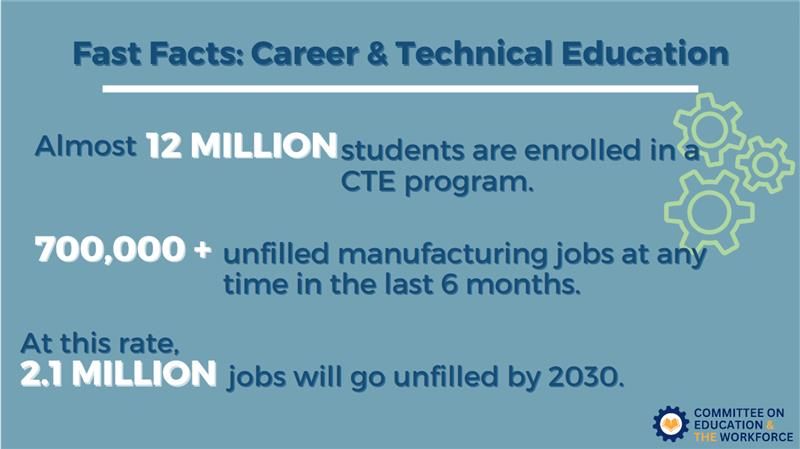
CTE is a huge field, encompassing everything from public school classes and courses to post-secondary technical schools and institutions. Some CTE involves a more traditional classroom structure, with lectures, reading, and exams. But most of it tends to be hands-on, in both practice and live environments. Here’s an overview of what CTE might look like at various levels.
Middle and High School CTE
Every state in the United States has its own career and technical education programs. They’re all aimed at career awareness and readiness, giving students both technical and soft skills that will help them succeed in their future jobs. CTE at the middle and high school levels includes:
- School courses: Students may enroll in classes like accounting, business education, bookkeeping, computer programming, and more as part of their traditional school education. These practical classes provide them with useful skills they can use in the future.
- Vocational/CTE high schools: Students who wish to focus their secondary education on specific career and technical skills may enroll in special schools geared to do just that. These might be set up by the state, county, or local school districts. They could also be charter or private schools. Either way, these schools provide an excellent pathway to earning a high school diploma while preparing to enter the workforce sooner. These students can also choose to enroll in college after graduation; 28% of CTE concentrators in high school later earn a four-year degree .
Learn about public school CTE programs and schools in your state here.
Post-Secondary Trade, Vocational, and Technical Schools
Whether or not students participate in career and technical education in high school, they may choose to enroll in post-secondary CTE schools after graduation. These technical institutions are usually not free, though financial aid may be available. Their courses are shorter than traditional colleges (usually 6-18 months), and the costs are lower too. Students may attend these schools full-time or take courses part-time while also working to pay their expenses.
Also called career colleges or technical institutes, trade and vocational schools offer courses in specific technical skills students need in their careers, such as welding, auto mechanics, carpentry, HVAC repair, health and beauty services, and so on. These courses can last weeks or months, depending on the school and area of study.
Students can take individual classes or courses, or pursue a longer program in subjects like health-care tech, service and hospitality, business administration, legal services, and more. These schools often prepare students to take certification or licensing exams too.
Choosing a good CTE school is important, since it involves an investment of time and money. Do your research to ensure the school is accredited or licensed and has a history of helping graduates find good jobs. The FTC has good advice on choosing a vocational school or certification program here.
Apprenticeships
Some employers and trade unions still offer apprenticeship programs. In an apprenticeship, a person is paid to work and learn at the same time. The take-home pay is usually lower, as part of the compensation is the education received. As students complete various levels of their training and education, their salary increases. Apprenticeships are most common in skilled manual trades like HVAC, carpentry, and welding. Find out more about apprenticeship programs here.
What are your thoughts on the importance of career and technical education? Join the conversation in the We Are Teachers HELPLINE group on Facebook .
Plus, 30 awesome career-readiness activities that teach soft skills ..
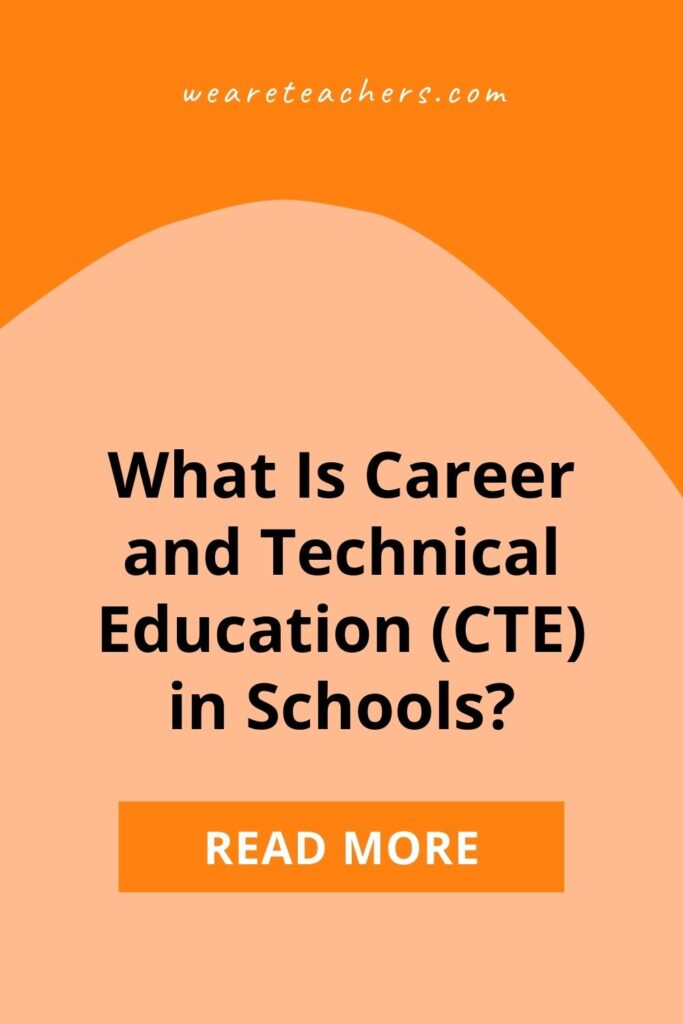
You Might Also Like

College Is Not for Everyone, and It’s Time High Schools Reflect That
A quarter of higher-education attendees earn less than high school graduates 10 years down the line. Continue Reading
Copyright © 2024. All rights reserved. 5335 Gate Parkway, Jacksonville, FL 32256
Master of Science (MSEd) in Career & Technical Education
Graduate Programs
The graduate program in Career and Technical Education prepares leaders who are concerned with education and training that enables youth and adults to pursue their careers. The program serves professionals from the Career and Technical Education curriculum disciplines, guidance and counseling, special education, academic content areas, adult education, training and development, as well as human resource development and management in the public and private sectors.
This residential program has rolling admission . Applications must be fully complete and submitted (including all required materials) and all application fees paid prior to the deadline in order for applications to be considered and reviewed. For a list of all required materials for this program application, please see the “Admissions” tab below.
July 1 is the deadline for Fall applications.
November 15 is the deadline for Spring applications.
March 15 is the deadline for Summer applications.
This program does not lead to licensure in the state of Indiana or elsewhere. Contact the College of Education Office of Teacher Education and Licensure (OTEL) at [email protected] before continuing with program application if you have questions regarding licensure or contact your state Department of Education about how this program may translate to licensure in your state of residence.
Application Instructions for the residential Career and Technical Education MSEd program from the Office of Graduate Studies :
In addition to a submitted application (and any applicable application fees paid), the following materials are required for admission consideration, and all completed materials must be submitted by the application deadline in order for an application to be considered complete and forwarded on to faculty and the Purdue Graduate School for review.
Here are the materials required for this application
- Transcripts (from all universities attended)
- Minimum undergraduate GPA of 3.0 on a 4.0 scale
- 3 Recommendations
- Resume/CV preferred
- Academic Statement of Purpose
- Personal History Statement
- International Applicants must meet English Proficiency Requirements set by the Purdue Graduate School
We encourage prospective students submit an application early, even if not all required materials are uploaded. Applications are not forwarded on for faculty review until all required materials are uploaded.
When submitting your application for this program, please select the following options:
- Select a Campus: Purdue West Lafayette (PWL)
- Select your proposed graduate major: Curriculum and Instruction
- Please select an Area of Interest: Career and Technical Education
- Please select a Degree Objective: Master of Science in Education (MSED)
- Primary Course Delivery: Residential
Program Requirements
Foundations.
EDCI 54100: Contemporary Issues in Career and Technical Education EDCI 55000: Career Education EDCI 64500: Organization and Administration of Career and Technical Education
Curriculum and Instruction
EDCI 54300: Instruction in Career and Technical Education EDCI 54400: Career and Technical Education for Special Needs Learners EDCI 55200: Generalizable Skills Instruction in Career and Technical Education EDCI 64800: Curriculum in Career and Technical Education EDCI 65300: Seminar in Career and Technical Education EDCI 69500: Internship in (Career Education, Career Pathways, Generalizable Skills Instruction, Special Needs, Field Experience in Business and Industry, Shadowing and Mentoring)
Administration and Policy
EDCI 54500: Planning in Career and Technical Education EDCI 55300: Leadership Development in Career and Technical Education EDCI 64400: Legal Issues in Career and Technical Education EDCI 64600: Supervision in Career and Technical Education EDCI 69500: Internship in Career and Technical Education Administration
Disciplined Inquiry
EDCI 59000: Individual Research Problems EDCI 64700: Research in Career and Technical Education EDCI 64900: Assessment in Career and Technical Education EDCI 65000: Program Evaluation in Career and Technical Education EDCI 65300: Research Seminar EDCI 69800: Thesis Research EDCI 69900: Dissertation Research
Additional courses applicable to CTE Licenses:
Supplemental program information, graduate competencies.
Graduate students in the Career and Technical Education program will satisfy the six (6) graduate competency areas and components within each area. The competencies can be satisfied by successfully completing one or more of the activities listed within each competency area (see Guidelines below). A variety of venues such as courses, internships, and school-based activities can be used to satisfy the competencies. Diversity, access, and equity issues and practices are expected to be infused and pervasive within all competency areas and activities that satisfy student competency attainment. Each student’s approved graduate competency plan will be reviewed at least once each semester. All successfully completed competencies will have documentation in the form of products. After the student has satisfied all competencies and required activities, the advisor and committee members will conduct a final review and evaluation of the student’s portfolio. Upon final approval, a statement of certification of successful completion of the graduate competencies requirements will be forwarded by the advisor to the College of Education Graduate Studies Office for inclusion in the student’s file.
Monitoring and Assessment Procedures
- Student receives and reviews the Graduate Competencies Guidelines.
- Student meets with advisor to discuss his/her plan to satisfy the graduate competencies.
- Student develops his/her graduate competency plan.
- The advisor and committee review and approve the plan.
- The student implements the plan and develops the portfolio.
- The student and advisor meet at least once each semester to review the plan, monitor progress, and evaluate formatively the portfolio.
- All requirements in the graduate competency plan will be completed and satisfied no later than the middle of the last semester before expected graduation.
- The advisor and committee members review and evaluate summatively the student’s portfolio.
- The student delivers a presentation of his/her portfolio during or prior to the final oral examination.
- A statement of certification is forwarded to the College of Education Graduate Studies Office for inclusion in the student’s file when all of the graduate competencies have been satisfied.
Competencies
- Write a literature review
- Produce a proposal
- Literature review
- Conduct a research project
- Plan and implement a program
- Develop program or instructional materials
- Write a journal manuscript
- Prepare a thesis
- Research project
- Program improvement project report
- Instructional materials
- Journal manuscript
- Plan and deliver a workshop
- Present at a professional conference
- Present at a seminar
- Prepare a conference paper
- Write a project report
- Prepare and/ or publish a journal article
- Workshop presentation report
- Conference presentation report
- Seminar presentation report
- Conference paper
- Project report
- Journal manuscript/article
- Prepare a critical and reflective paper
- Write a critical analysis paper (critique)
- Develop a professional philosophy statement
- Critical analysis paper
- Philosophy statement
- Participate in workshops
- Attend professional conferences
- Maintain memberships in professional organizations
- Prepare a professional portfolio
- Workshop participation report
- Professional conference report
- Organization membership(s) log
- Prepare a report and critique of a conference or workshop
- Present at professional meetings
- Participate actively in professional associations
- Mentor colleagues
- Plan and deliver inservice workshops
- Provide technical assistance to colleagues
- Conference or workshop critique
- Professional meeting presentation report
- Professional association participation journal
- Mentoring log
- Inservice workshop report
- Technical assistance log
The competencies, activities, and products will use several venues that include courses, internships, independent studies, thesis research, seminars, comprehensive written examinations, oral examinations, school-based activities, professional organization activities, community activities, and others identified by the student, advisor, and/or committee members. The student will select one or more activities to satisfy the components of each competency area with the guidance of his/her advisor and committee members.
Graduate (General) Competencies
- Ackerman Center
- Serious Games
- CnI Online Fac
- Curriculum Studies
- Education for Work and Community
- Elementary Education
- English Education
- English Language Learning
- Learning Design and Technology
- Literacy and Language Education
- Mathematics Education
- Science Education
- Social Studies Education
- Applied Behavior Analysis
- Counseling and Development
- Educational Leadership and Policy Studies
- Educational Psychology and Research Methodology
- Gifted Education
- Special Education
James Greenan
Application procedure.
Course Registration, payment, drops/withdraws, and removing holds: Purdue Online [email protected] Career accounts: ITaP (765) 494-4000
The academic programs offered at Gwinnett Tech have been selected to provide a wide range of career choices for students. Programs are reviewed annually to verify the continued need for training in each area, and new programs are added as the need is established and resources permit. The review process includes faculty, administration, occupational advisory committees at the state and local level, and the Technical College System of Georgia.
The purpose of each Gwinnett Tech program is to provide employment training through general education and technical courses. General education courses support continued personal and professional growth and are designed to enable students to develop and demonstrate skills in reading, writing, oral communications, and math. Technical courses provide the solid basis of skills and knowledge necessary for successful employment; they are up-to-date in content, use the most modern equipment possible, and are taught by subject area experts.
In many programs, students have the option of enrolling in degree, diploma, or certificate programs. These three program options are generally distinguished by length in semesters and the number and level of general education classes. Degree programs typically range from 60 to 73 credit hours in length; diploma programs, from 37 to 59; and certificate programs, from 9 to 36. With approval of the State Board, maximum semester credit hours required for graduation may be extended beyond the required maximum credit hours.
Technical certificate of credit programs are a popular option among students. Certificate programs are designed to provide training for entry-level or advanced positions in a brief time frame. Courses taken in these programs generally apply to either degrees or diplomas in the same program area.
Regular admission policies apply to all Gwinnett Tech programs of study. Some programs have additional admission requirements.
Academic Advisement
Students are assigned an academic advisor upon acceptance to a program of study. The Enrollment Support Center staff works in partnership with the academic program advisors. Students are encouraged to visit the Enrollment Support Center to meet with their Enrollment Advisor for course schedule planning and progress counseling prior to registration. Although advisors assist students in academic planning, each student is responsible for meeting all graduation requirements.
Advisement Information/Instructor Office Hours
Students can view advisement information at the advisement tab at BannerWeb . All full-time instructors have scheduled office hours that are available from the instructor or through the office of academic affairs. Adjunct instructors are generally available for student conferences by appointment before or after scheduled class hours.
The Enrollment Support Center staff is available to assist students on a first-come-first-served basis and by appointment between the hours of 8:00 a.m. and 6:00 p.m. Monday through Thursday and between the hours of 8 a.m. and 4 p.m. on Friday. Students are able to download the QLess app for appointment setting and sign-in from the convenience of a smart phone. Enrollment Advisors are trained to assist students with questions regarding admissions, student records, financial aid and academic advisement.
Accreditation/Certifications/Agency Approvals
Accreditation is the process through which educational institutions are evaluated by regional and national agencies and associations to establish recognized program quality. Gwinnett Technical College is accredited by the Southern Association of Colleges and Schools Commission on Colleges (SACSCOC) to award the associate of applied science degree. Questions about the accreditation of Gwinnett Technical College may be dirrected in writting to the Southern Association of Colleges and Schools Commission on Colleges at 1866 Southern Lane, Decatur, Georgia 30033-4097 or call 404.679.4500 or by using information available on SACSCOC’s website www.sacscoc.org .
Course Evaluations
Course evaluations are distributed for each instructor, each semester. All courses will be evaluated except for a select few externships, internships, practicums, and clinical courses.
Nontraditional Fields for Students
The term ‘nontraditional fields’ means occupations or fields of work, including careers in computer science, technology and other current and emerging high skill occupations, for which individuals from one gender comprise less than 25 percent of the individuals employed in each such occupation or field of work. Gwinnett Tech encourages students to participate in their program of choice regardless of traditional patterns of enrollment.
Program Completion Requirements
Students will be considered as having met the requirements for graduation with an associate degree, diploma, or certificate when the following conditions are met.
- Student has filed an application for graduation online at BannerWeb and paid the required $40 processing fee. Completion of course requirements does not automatically indicate an award of graduation. Students must complete an application for graduation to initiate the official audit. Graduation application must be received within two years of program completion in order to be awarded. Students who completed their program more than two years ago should contact graduation services for assistance at [email protected] .
- Student has completed a program of study, including all required courses/electives, meeting minimum credit hour requirements.
- Student has earned a minimum grade of C or better in all courses and electives in the program of study.
- Student has completed at least 25 percent of required credit from the declared program of study at Gwinnett Technical College.
- Gwinnett Technical College will limit academic residency to no more than twenty-five percent of the degree requirements for all degrees for active-duty Service members. Academic residency can be completed at any time while active-duty Service members are enrolled. Reservist and National Guardsmen on active-duty are covered in the same manner.
- Student has paid all required fees, fines, and other financial obligations owed to Gwinnett Tech.
- Student has cumulative GPA of 2.0 or higher at the time that the graduation application is submitted.
- Student must complete all required developmental coursework in order to graduate from certificate, diploma or degree program. This requirement includes 097 courses for certificate program that do not require core classes.
- Students whose catalog year is Fall 2014 or newer according to their Degree Works audit are required to satisfy the FYES 1000 requirement, either by taking the course, or by exemption (if eligible) to be eligible to graduate.
- Please note that at the time a student graduates from his or her program, COMP 1000 (Introduction to Computers) and many CIST courses cannot be older than seven years. The student’s options are to take the course(s) over or take an exemption exam if available in the Assessment Center. Please review your DegreeWorks audit with your Enrollment Advisor if you have any questions regarding FYES 1000 requirements, your degree progress, or required coursework.
Program Structure
Programs of study/majors , general education courses.
All associate degree and diploma programs include specified general education courses. Associate degree programs require at least 15 credits of general education college-level courses; and all programs require at least 3 credits from each of the following areas: English, humanities/fine arts, social/behavioral sciences, and natural sciences/ mathematics. Diploma programs require a minimum of 8 credit hours in English, mathematics, and interpersonal relations and professional development.
Area I - Language Arts/Communication
- ENGL 1101 - Composition and Rhetoric Credit hours: 3
- ENGL 1102 - Literature and Composition Credit hours: 3
- COMM 1100 - Human Communication Credit hours: 3
- SPCH 1101 - Public Speaking Credit hours: 3
Area II - Social/Behavioral Sciences
- ECON 1101 - Principles of Economics Credit hours: 3
- ECON 2105 - Principles of Macroeconomics Credit hours: 3
- ECON 2106 - Principles of Microeconomics Credit hours: 3
- HIST 1111 - World History I Credit hours: 3
- HIST 1112 - World History II Credit hours: 3
- HIST 2111 - U. S. History I Credit hours: 3
- HIST 2112 - U. S. History II Credit hours: 3
- POLS 1101 - American Government Credit hours: 3
- POLS 2401 - Global Issues Credit hours: 3
- PSYC 1101 - Introductory Psychology Credit hours: 3
- SOCI 1101 - Introduction to Sociology Credit hours: 3
Area III - Natural Sciences/Mathematics
- MATH 1111 - College Algebra Credit hours: 3
- MATH 1103 - Quantitative Skills and Reasoning Credit hours: 3
- BIOL 1111 - Biology I Credit hours: 3
- BIOL 1111L - Biology Lab I Credit hours: 1
- BIOL 1112 - Biology II Credit hours: 3
- BIOL 1112L - Biology II Lab Credit hours: 1
- BIOL 2107 - Biological Principles I Credit hours: 3
- BIOL 2107L - Biological Principles Lab I Credit hours: 1
- CHEM 1151 - Survey of Inorganic Chemistry Credit hours: 3
- CHEM 1151L - Survey of Inorganic Chemistry Lab Credit hours: 1
- CHEM 1152 - Survey of Organic Chemistry and Biochemistry Credit hours: 3
- CHEM 1152L - Survey of Organic Chemistry and Biochemistry Lab Credit hours: 1
- CHEM 1211 - Chemistry I Credit hours: 3
- CHEM 1211L - Chemistry Lab I Credit hours: 1
- CHEM 1212 - Chemistry II Credit hours: 3
- CHEM 1212L - Chemistry Lab II Credit hours: 1
- PHSC 1111 - Physical Science I Credit hours: 3
- PHYS 1110 - Conceptual Physics Credit hours: 3
- PHYS 1110L - Conceptual Physics Lab Credit hours: 1
- PHYS 1111 - Introductory Physics I Credit hours: 3
- PHYS 1111L - Introductory Physics Lab I Credit hours: 1
- MATH 1112 - College Trigonometry Credit hours: 3
- MATH 1113 - Precalculus Credit hours: 3
- MATH 1127 - Introduction to Statistics Credit hours: 3
- MATH 1131 - Calculus I Credit hours: 4
- MATH 1132 - Calculus II Credit hours: 4
Area IV - Humanities/Fine Arts
- ARTS 1101 - Art Appreciation Credit hours: 3
- ENGL 2110 - World Literature Credit hours: 3
- ENGL 2130 - American Literature Credit hours: 3
- HUMN 1101 - Introduction to Humanities Credit hours: 3
- MUSC 1101 - Music Appreciation Credit hours: 3
- RELG 1101 - World Religions Credit hours: 3
General Education Elective:
To meet the minimum required 15 semester credit hours in General Core Courses, an additional 3 semester credit hours must be taken from Area I, Area II, Area III, or Area IV.
Student Learning Outcomes
Gwinnett Tech, in conjunction with employers and others, believes that learning outcomes foster the knowledge, skills, and values essential to students in their pursuit of lifelong learning and a satisfying career. Achievement of these outcomes occurs over several courses throughout a student’s educational experience and guarantees access to all the overlying skills important for graduates of Gwinnett Technical College to have mastered.
Each academic program at Gwinnett Tech identifies outcomes to address the continuous improvement of education. The learning outcomes are directly addressed by methods and criteria designed to demonstrate achievement of those outcomes, and improvements are implemented that impact the quality of each program’s function. A learning outcome is a brief, clear statement identifying in measurable terms the intended result of achievement of competencies. Learning outcomes focus on the specific performance(s) students are expected to demonstrate when the outcome is achieved. The means of assessment is a description of the methodology used to gather data in order to determine whether the learning outcomes have been achieved. Success criterion is a statement of the specific standards that identify successful achievement of the intended student learning outcomes, which are as follows:
These include the following:
Collaboration and Teamwork: Students will work in teams of diverse composition in a respectful manner to achieve a specific goal and/or assignment
Communication Skills: Students will learn the ability to express oneself through the transfer of opinions, ideas, knowledge, and/or skills accomplished by writing, speaking, listening, and reading.
Logical Reasoning: Students will apply cognitive skills requiring mental agility and intellectual discipline gathered from, or generated by, creativity, observation, experience, reflection, reasoning, or communication. Logical reasoning is used to analyze, synthesize, or evaluate information associated with a new problem .
Mathematical Concepts: Students will learn that mathematical concepts are descriptions, properties, relationships, operations, and ideas that can be expressed quantitatively, numerically, algebraically, or geometrically.
Reading Comprehension: Students will demonstrate the ability to understand, analyze and evaluate readings and apply that learning to academic and professional contexts..
Research and Locating Information: Students will locate valid and reliable data sources and critically evaluate the appropriateness of information to industry standards.
Technical Competency and Proficiency: Students will demonstrate technical competency necessary to meet industry standards and entry level knowledge and skills appropraite to the discipline.
Technical Proficiency: The student will demonstrate technical competency necessary to meet industry standards of entry level knowledge and skills appropriate to the discipline.
Work Ethics: Students will demonstrate a commitment to evolve as a productive member of society and the workplace, through a concerted and continuous effort of reflection and adjustment of one’s values, habits, and attitudes, as they affect on-the-job performance and overall life goals.
Electives are designated in two ways - general and technical or technically-related. Students may choose general electives from the variety of programs offered at Gwinnett Tech. Students must choose technical or technically-related electives from the program area indicated with academic advisor approval. Students must also meet all prerequisites for elective courses, including test scores. For guidance on program-specific elective options, please consult DegreeWorks and meet with an Enrollment Advisor regarding any questions you may have.
Note: Diploma-level general education courses cannot be used as electives in associate degree programs.
Technical Education Guarantee
The Technical College System of Georgia has developed curriculum standards with the direct involvement of business and industry. These standards serve as the industry-validated specifications for each occupational program. These standards allow Georgia’s technical colleges to offer their business partners the following guarantee:
“If one of our graduates who was educated under a standard program and his/her employer agree that the employee is deficient in one or more competencies as defined in the standards, the technical college will retrain that employee at no instructional cost to employee or employer.”
This guarantee applies to all Gwinnett Tech graduates who are employed in their field of training and is in effect for a period of two years after graduation.
Cookies on GOV.UK
We use some essential cookies to make this website work.
We’d like to set additional cookies to understand how you use GOV.UK, remember your settings and improve government services.
We also use cookies set by other sites to help us deliver content from their services.
You have accepted additional cookies. You can change your cookie settings at any time.
You have rejected additional cookies. You can change your cookie settings at any time.
- Education, training and skills
- Further and higher education, skills and vocational training
- Further and higher education courses and qualifications
Technical education learner survey 2023: progression of the first T Level cohort
A report on T Level learners' outcomes, destinations, future plans and course experiences.
Applies to England
Ref: ISBN 978-1-83870-545-9, RR1413
PDF , 688 KB , 81 pages
Technical education learner survey 2023: data tables for cohort 1
MS Excel Spreadsheet , 854 KB
This report is based on a survey, carried out in 2023, which covered the first cohort of T Level learners. This cohort started their programme in September 2020.
It draws on data from 3 longitudinal surveys of this cohort.
It focuses on learners’:
- destinations and outcomes after the course
- future plans, including intentions for work or study, and factors shaping their career decisions
- reflections on T Levels
The data tables provide the underlying information for the report.
The report also uses data from earlier surveys of this cohort for longitudinal analysis, for example relating destinations to course experience.
The technical education learner survey 2022 has findings from the second year of fieldwork.
Is this page useful?
- Yes this page is useful
- No this page is not useful
Help us improve GOV.UK
Don’t include personal or financial information like your National Insurance number or credit card details.
To help us improve GOV.UK, we’d like to know more about your visit today. We’ll send you a link to a feedback form. It will take only 2 minutes to fill in. Don’t worry we won’t send you spam or share your email address with anyone.
Waubonsee Community College breaks ground on…
Share this:.
- Click to share on Facebook (Opens in new window)
- Click to share on X (Opens in new window)
- Click to print (Opens in new window)
- Click to email a link to a friend (Opens in new window)
- Entertainment
- Immigration
- Sports Betting
Aurora Beacon-News
Waubonsee community college breaks ground on new $60 million technical training center.

Waubonsee Community College broke ground on a new $60 million Technical Education Center at its Sugar Grove campus on Tuesday.
When it opens in fall 2025, the new 100,000-square-foot, state-of-the-art building will house the college’s automotive technology, auto body repair and welding technology programs, school officials said.
According to Ne’Keisha Stepney, executive dean for business, technology and workforce education at Waubonsee, the new building will allow the college to increase enrollment and offer new curriculums in these high-demand programs.
“The addition of the TEC building is transformational,” Stepney said at the Tuesday groundbreaking ceremony. “Our programs will be at the forefront – modern and delivering on industry-responsive career pathways that align with the economic needs of business and industry.”
While the building will house new technology and tools, allowing existing programs to expand into new areas of study like electric vehicles and robotic welding, the building will also have the flexibility to change with the times, according to Waubonsee Community College President Brian Knetl.
“We want to make sure that it lasts for a long, long time, but that what goes on in that building responds to the community’s needs,” Knetl said after the ceremony.
The building is “simply the next example” of how the college works with its industry partners to meet their employment needs, according to Kentl.
Guy Tiberio, an associate professor of automotive technology at Waubonsee Community College and one of the program’s former students, said there are often waitlists to get into the automotive program. Plus, there are a number of jobs waiting for those who graduate, he said.
“There’s a lot of people who want to come in, but we can only let in so many people because of the space limitations,” Tiberio said. “We’re getting rid of that, essentially, with this new building, so we’re able to have more instructors teach more sections of classes to get more students in the program.”
Once they get into the program, students will also have more opportunities, according to Tiberio. He said the setup of the new building will be very similar to the environment they will be working in once they graduate and get a job in the real world.
Plus, additional curriculums in topics like diesel and electric vehicles will set Waubonsee graduates apart from others competing for the same jobs, Tiberio said. For local businesses, he said this means more skilled employees.
“Because of our space, we don’t turn out enough students to fill all the open jobs,” Tiberio said. “We’re hoping that, because we can get more students through the program, we can help our local industry fill more of the jobs, and not only just fill the jobs, but get them people who are qualified and knowledgeable.”
According to Stepney, the programs going into the new Technical Education Center are already recognized both statewide and nationwide for their success.
At the ceremony, five students were honored for making it to the finals in the Mopar Career Automotive Program Bracket Challenge. The team won three previous rounds made up of 16 schools from across the United States, according to a news release from the college.
For the automotive program, the new building will increase lab space to 22 bays and four specialized labs. Bays will include in-ground lifts, double-wide doors and rooms that can easily accommodate students as they watch or get hands-on with their instructors alongside the vehicles they are working on, according to Stephney.
She said the building will also have better lighting and a more efficient flow to the layout, helping students to waste less time moving items around and spend more time focused on their work.

For welding, booths will be increased from 16 to 32, will incorporate welding fabrication and will be better suited to pipe welding, Stepney said.
The building will also have general classrooms, computer labs, office space, common space and spaces dedicated to industry use for conferences or expos, according to Stepney.
“We were very intentional about our goal for this facility to be a hub of workforce education and training here at Waubonsee Community College,” she said.
Groundwork for the new building began around a month ago, according to Knetl. He said structures for the new building should be seen going up within the next couple of months.
The college is still deciding what it will do with the buildings that currently house the automotive technology, auto body repair and welding technology programs, Knetl said.
More in Local News

Aurora Beacon-News Sports | West Aurora’s Keira Hayton wasn’t slaphappy. She had a concussion. But a year later? ‘She flies under the radar.’

Daily Southtown | Lawsuit claims Lansing police officer shoved student at Thornton Fractional South
![Creating a more welcoming and inclusive community, affordable housing and community character are among the priorities of Wilmette residents, according to a draft of the village’s 2024 comprehensive plan. The voluminous 142-page document titled “Ready Set Wilmette” is a blueprint of sorts for the future of the village and includes 11 chapters on everything from community character to housing, diversity and inclusion to sustainability and business and commerce, said Wilmette village manager, Mike Braiman. “We want to identify what the community felt were priorities for us,” Braiman explained. “We think we have a unique comprehensive plan in a […] Creating a more welcoming and inclusive community, affordable housing and community character are among the priorities of Wilmette residents, according to a draft of the village’s 2024 comprehensive plan. The voluminous 142-page document titled “Ready Set Wilmette” is a blueprint of sorts for the future of the village and includes 11 chapters on everything from community character to housing, diversity and inclusion to sustainability and business and commerce, said Wilmette village manager, Mike Braiman. “We want to identify what the community felt were priorities for us,” Braiman explained. “We think we have a unique comprehensive plan in a […]](https://www.chicagotribune.com/wp-content/uploads/2024/04/PPN-L-WLM-comprehensiveplan-050224-01.jpg?w=424)
Local News | Wilmette Village Board outlines 2024 comprehensive plan

Naperville Sun | What we do — and don’t — know about the gun-related arrests at Naperville’s Topgolf
Trending nationally.
- High school athletic director used AI to fake racist recording of principal, police say
- Chicago Bears’ flashy game plan for lakefront stadium project greeted with questions
- Backcountry skier says group that triggered avalanche left without rendering aid
- Allstate will insure California homes again, under one condition
- Barbra Streisand drops first new song in 6 years in response to rise in antisemitism
Govt Jobs & Employees Galaxy World
Employees corner, education and govt jobs, technical education and vocational training authority jobs for visiting faculty 2024.
There is the current announcement for Visiting Faculty for Short Courses in TEVTA. These temporary jobs in Technical Education and Vocational Training Authority are for the visiting instructors. The details are as follows:
Visiting Faculty Vacancies for Short Courses in TEVTA 2024
Qualification and experienced visiting faculty for the following short courses are required in respect of Govt. Technical Training Institute, Khanewal Road, Multan purely on a temporary basis.
Terms and Conditions
- The candidates are required to appear in an interview dated 30-04-2024 (Tuesday) at 10:00 AM in the office of Principal, GTTI, Khanewal Road, Multan along with a set of attested copies and original relevant documents.
- NO TA/DA will be admissible.
You may also like: Fazaia Inter College Murree Jobs 2024

These jobs are on the basis of a walk-in Interview. The willing candidates should appear as per the schedule of the interview.
Related Posts:

Share this post
Recommended for you, fazaia inter college lower topa (murree) jobs april 2024, cadet college kohat situation vacant for lecturers (bps-17) 2024, recruitment on deputation basis in national vocational & technical training commission islamabad, ministry of aviation stenotypists, ldcs and naib qasids jobs 2024, post comment cancel reply.
This site uses Akismet to reduce spam. Learn how your comment data is processed .
'ZDNET Recommends': What exactly does it mean?
ZDNET's recommendations are based on many hours of testing, research, and comparison shopping. We gather data from the best available sources, including vendor and retailer listings as well as other relevant and independent reviews sites. And we pore over customer reviews to find out what matters to real people who already own and use the products and services we’re assessing.
When you click through from our site to a retailer and buy a product or service, we may earn affiliate commissions. This helps support our work, but does not affect what we cover or how, and it does not affect the price you pay. Neither ZDNET nor the author are compensated for these independent reviews. Indeed, we follow strict guidelines that ensure our editorial content is never influenced by advertisers.
ZDNET's editorial team writes on behalf of you, our reader. Our goal is to deliver the most accurate information and the most knowledgeable advice possible in order to help you make smarter buying decisions on tech gear and a wide array of products and services. Our editors thoroughly review and fact-check every article to ensure that our content meets the highest standards. If we have made an error or published misleading information, we will correct or clarify the article. If you see inaccuracies in our content, please report the mistake via this form .
Get this Microsoft tech certification training bundle for $80
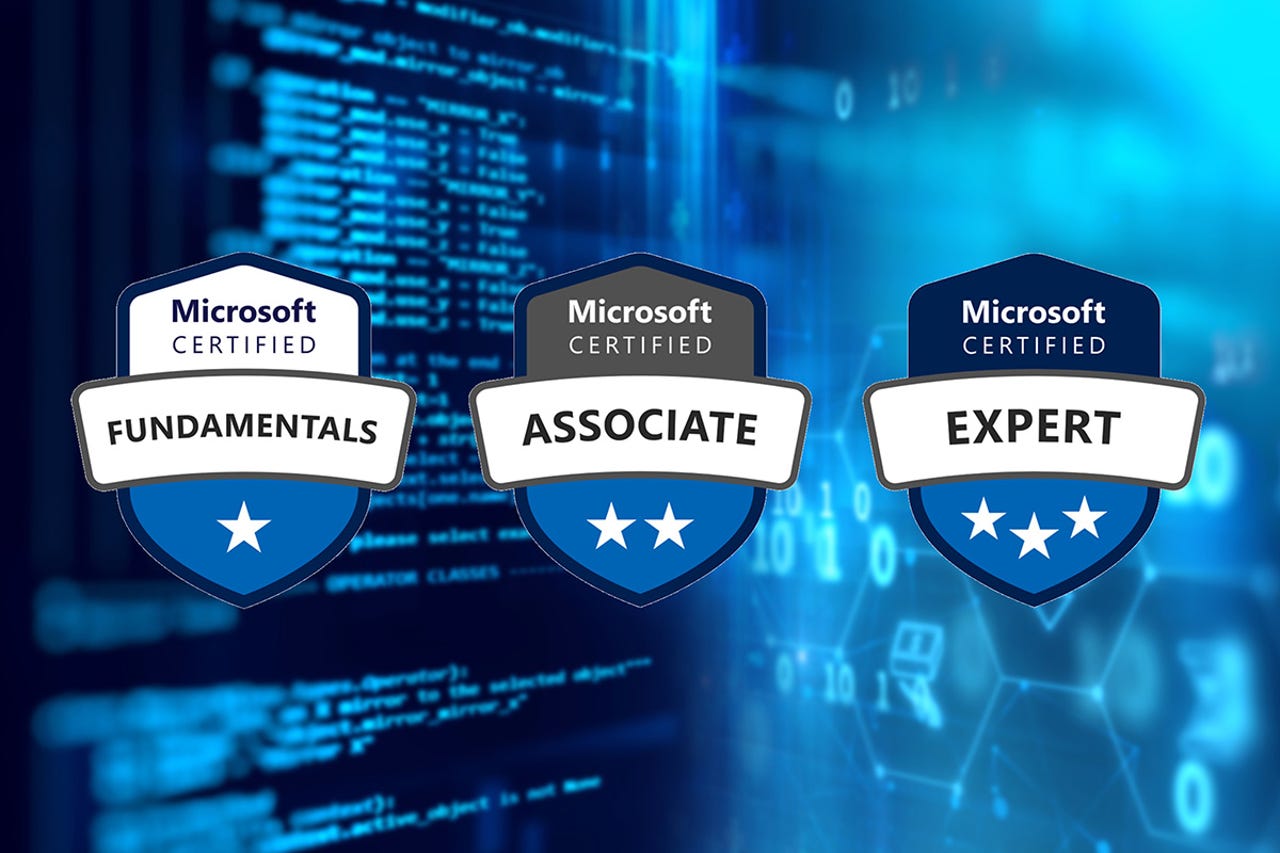
Get this Microsoft Tech Certification Training bundle for $80.
Microsoft has a vast roster of software and programs, and those who are trained with its tech are uniquely qualified for a long-running and well-established job market.
For those who are interested in learning and gaining qualifications for Microsoft's technology , it's worth checking out this affordable educational experience. The Complete 2024 Microsoft Tech Certification Training Super Bundle is on sale for just $80 (reg. $429).
The Complete 2024 Microsoft Tech Certification Training Super Bundle
This comprehensive bundle features eleven courses and nearly 250 hours of content on Microsoft tech. One of the top courses in the bundle "Managing Modern Desktops (MD-101)," features sixty-four lectures on a wide range of foundational concepts.
Here, a student can gain an understanding of operating system deployment and upgrading strategy. The course also covers various deployment methods, configuring Intune, configuring Windows Update policies, migrating desktops to Windows 10, and more.
Another popular course in this bundle, Microsoft Mobility and Security (MS-101), features eighty-six lectures on a range of topics, including data governance practices within the Microsoft 365 Intelligence framework. It also covers best practices for managing devices and conducting searches and investigations.
Plenty of other helpful courses are also included, such as the following:
Microsoft 365 Identity & Services (MS-100)
Designing Microsoft Azure Infrastructure Solutions (AZ-305)
MD-100: Windows Client
AZ-500: Microsoft Azure Security Technologies
Microsoft Azure Administrator (AZ-104)
All courses in this comprehensive Microsoft training bundle are taught by instructors from IDUNOVA, an organization with over twenty years of experience offering IT courses and educational experience. Students can trust they receive the most up-to-date knowledge on all things Microsoft technology.
Get The Complete 2024 Microsoft Tech Certification Training Super Bundle on sale for $80.
ZDNET Recommends
This comptia training bundle is on sale for $64, get microsoft visual studio pro for $45 right now, save 86% on this lifetime license bundle for microsoft office pro 2021 and windows 11 pro.
- Innovation at WSU
- Directories
- Give to WSU
- Academic Calendar
- A-Z Directory
- Calendar of Events
- Office Hours
- Policies and Procedures
- Schedule of Courses
- Shocker Store
- Student Webmail
- Technology HelpDesk
- Transfer to WSU
- University Libraries

Wichita State University has helped lead the way in creating a standard for badges offered across institutions and corporations. WSU's Office of Workforce, Professional and Community Education collaborates with employers and faculty to develop badges in response to workforce needs.
Badges at WSU support the workforce through targeted training opportunities
By Caelin Bragg
- Wichita State University offers badge courses to working professional to enhance and retrain their current experience and skills.
- The TrustEd Microcredential Coalition was formed to develop national standards for badges, which WSU is a founding member of.
- Badges are developed in response to workforce needs alongside employers, licensing agencies and faculty.
Wichita State University has offered the traditional educational pathways for over 125 years, typically ending at the point of graduation, but the need for learning continues throughout a person’s lifetime.
In a rapidly changing world, continuing education has never been more important. More and more jobs require skill-based certification of learning, which includes the attainment of validated durable and technical skills. To meet those needs, WSU was the first in Kansas to create badge courses for non-degree seeking students in 2015, after approval from the Kansas Board of Regents.
Badges are short courses of one credit hour or less, and instruction is designed using modules of skills-based learning and application. Students in the badge courses must pass with a success rate of 80-85% on all assignments to receive a Badge Granted grade, or BG, which then becomes part of a student’s official WSU transcript.
Designed for adults balancing work and family obligations, badges offering coursework online using open educational resources, meaning no textbooks are required. Coursework completion is flexible, with the requirement that coursework must be completed during the semester it is started. Taught by university faculty, coursework and instruction meets all higher learning education requirements.
A unique aspect of WSU badge courses is that the skills and competency-based curriculum is developed in partnership and with input of employers, government licensing agencies, trade associations and faculty.
“WSU has taken an approach much different than many institutions,” said Kim Moore, executive director of Workforce, Professional and Community Education, who manages badges at WSU. “Instead of partnering one on one with a business, the university is focusing its efforts on professions where we see the greatest need and impact potential. Currently, my work centers around the development of skill-based badges creating career pathways for direct support professionals, who are individuals that provide direct care to individuals with intellectual and behavioral disabilities. Due to a lack of training, low wages and no career pathway, it has been difficult to recruit and retain direct support professionals, and the wait list in Kansas for services is 10 years.”
Badges are value-added education for individuals who already have a degree and can be used for relicensure for many professions. Badges may also be stacked to create skills-based career pathways and certifications for individuals who don’t have or need a degree.
In what has largely been the wild west of education and training, there has been no consistency in how and why badges are awarded and no way to track and validate their integrity and value, Moore says. Anyone could award a badge for any reason, and employers could never be sure any documented meaningful learning occurred.
In response, Wichita State has become a leader in the development of national standards related to badges and digital credentials as a founding member of the TrustEd Microcredential Coalition through 1EdTech, a community of leaders from across education sectors and edtech suppliers to build an ecosystem to help learners. The microcredential metadata framework was released from the coalition to set recommended data requirements for microcredentials.
“When someone says they have a badge, what does that even mean?” Moore said. “We really don’t know because there hasn’t been a way to validate and verify what learning occurred. That’s why there is the TrustEd Microcredential Coalition, because we are trying to make sure that standards are met, metadata is acquired and that learning can be validated.”
An advantage badges have over traditional coursework and degrees is their flexibility. Badges can quickly adapt, morph or be created to meet the needs of employers and professionals.
One such badge that is currently under development, for launch in 2025, is the Aging Care Professional (ACP) Badge, which aims to complement health care professionals’ education in the field of aging populations.
“It’s us as a community saying, ‘but they need to know this stuff, too,’” said Robert Miller — lecturer in the Department Public Health Sciences in the College of Health Professions — who is currently helping develop the ACP badge. “It can come alongside health care professionals, and they can say, ‘I’m a CNA or newly vetted nurse with my license, but I want more experience in dealing with the aging population.’ They now have something that they can add to their education to get additional skills to be successful.”
When deciding on what badges to offer next, Moore looks to the workforce to see the common concerns employers have and where WSU can help fill in the gaps. Once a workforce need has been identified, a team is put together to develop a badge — with insight from faculty, employers and Moore’s office — that meets those needs.
“It’s all about skills and competencies,” Moore said. “It’s not about grades. It’s about if you can master a skill and become competent and be able to apply that learning in an employment setting, which makes them different than other types of education.”
Matt Fletcher — executive director at InterHab, a Kansas-based trade association that represents service providers for those with intellectual and developmental disabilities — is one of the workforce partners who helped develop the Direct Support Professional Badges offered at WSU, which aim to provide foundational skills to those working in the intellectual and developmental disabilities field.
“There’s a number of reasons why badges are very important, and I would argue critical, for our workforce,” Fletcher said. “The intellectual and developmental disabilities system has grown and been developed organically in response to the needs of individuals and communities, but one of the challenges with that is we never took the time to formally create a means by which we develop the workforce. So courses, like those offered from Wichita State University, give us foundational elements that are needed to begin professionalizing our workforce.”
Fletcher also underscored the benefit of having the badges offered online, allowing professionals from across the state to access the professional development opportunities offered even while they work full time.
Moore is not only spearheading WSU’s badge program, she is also a nationwide leader on microcredentials, who was recently elected to 1EdTech’s board of directors in early 2024 and received a 2022 Leadership Award for higher education leadership from 1EdTech.
“We can have a great impact if, in my opinion, we focus on professions and not individual businesses, so that’s where I’ve been focusing my efforts,” Moore said. “How can I make a difference within our state and within our community? How can I benefit the people who live here and those that hire them? I am fortunate to be able to focus on such meaningful work that impacts and improves the lives of the state’s most vulnerable populations while providing individuals in low-wage jobs with a career pathway to a better future.”
For a complete catalog of WSU badge courses, visit wichita.edu/badges .
About Wichita State University
Wichita State University is Kansas' only urban public research university, enrolling more than 23,000 students between its main campus and WSU Tech, including students from every state in the U.S. and more than 100 countries. Wichita State and WSU Tech are recognized for being student centered and innovation driven.
Located in the largest city in the state with one of the highest concentrations in the United States of jobs involving science, technology, engineering and math (STEM), Wichita State University provides uniquely distinctive and innovative pathways of applied learning, applied research and career opportunities for all of our students.
The Innovation Campus , which is a physical extension of the Wichita State University main campus, is one of the nation’s largest and fastest-growing research/innovation parks, encompassing over 120 acres and is home to a number of global companies and organizations.
Follow Wichita State on social media:
- X | Twitter
Related Stories

Shocker students earn coveted NSF graduate research awards

Texas Shocker Spotlight: Alex Day

15 full-ride Rudd Scholarships awarded to WSU-bound students

New Duerksen amphitheater mural will celebrate Wichita State's Hispanic influences

IMAGES
VIDEO
COMMENTS
Recognizing these trends, career and technical education reshaped itself as a new kind of pathway: one that includes some form of postsecondary training. That could mean earning certification or ...
A course designed to introduce teacher candidates to Career and Technical Education (CTE), school law, and developing student leaders. The course consists of six modules that provide you an overview of CTE, the educational environment for career and technical education in Washington State, the connection between CTE and the community, legal ...
Career and technical education (CTE) is the practice of teaching specific career skills to students in middle school, high school, and post-secondary institutions. CTE is split into 16 career clusters that apply to different high-demand careers: Health Science. Business. Sales.
According to the National Center for Education Statistics, Career and Technical Education, or CTE, is defined as the courses and programs in middle and high schools that focus on the skills and knowledge required for specific jobs or fields of work.. In other words, it is an opportunity for students to explore career options and personalize their education pathway based on their career ...
Career and technical education (CTE) provides an important pathway to success for high school students and offers each student opportunities to personalize his or her education based on their career interests and unique learning needs. CTE refers to courses and programs designed to prepare students for careers in current or emerging professions.
technical education, the academic and vocational preparation of students for jobs involving applied science and modern technology. It emphasizes the understanding and practical application of basic principles of science and mathematics, rather than the attainment of proficiency in manual skills that is properly the concern of vocational education.
Major Credits: 30. No GRE Required. The Master of Arts in Career and Technical Education (CTE) is 100-percent online. Requiring only 30 credits and no thesis, our flexible curriculum is offered year round and is designed to help you achieve your degree and professional goals as quickly as possible. This CTE master's program is a good choice for ...
What Is CTE? Today's cutting-edge, rigorous and relevant career and technical education (CTE) prepares youth and adults for a wide range of high-wage, high-skill, high-demand careers. Learn more with our Basic Facts, Policy and Advocacy Publications and State Fact Sheets. Download Infographic.
Compelling research on CTE recently doubled with the release of a new study of regional vocational and technical high schools (RVTS) in Massachusetts. 21. Unlike the Career Academies described ...
Career and technical education is a term applied to schools, institutions, and educational programs that specialize in the skilled trades, applied sciences, modern technologies, and career preparation. It was formerly (and is still commonly) called vocational education; however, the term has fallen out of favor with most educators.. Career and technical programs frequently offer both academic ...
Make a Difference Teaching Technical Education. UW-Stout's Bachelor of Science (B.S) in Career, Technical Education & Training is a degree completion program designed for working adults who aspire to teach in a technical or community college setting. This program provides instructors and non-instructors the opportunity to articulate an Associate's Degree or Technical Diploma to a Bachelor's ...
The rise of standards-based education witnessed the de-prioritization of skills-based education, and as a result, many students' access to opportunities to develop technical skills declined. A ...
Take the next step toward your personal and professional goals with Coursera. Join for Free. Learn new job skills in online courses from industry leaders like Google, IBM, & Meta. Advance your career with top degrees from Michigan, Penn, Imperial & more.
Some 8.3 million high school students participated in what are now called career and technology education, or CTE, pathways in 2020-2021, up from 7.5 million the previous year, according to the U ...
Professional Certificate. Learn Information Technology or improve your skills online today. Choose from a wide range of Information Technology courses offered from top universities and industry leaders. Our Information Technology courses are perfect for individuals or for corporate Information Technology training to upskill your workforce.
Here are a few examples of those roles, plus the median yearly U.S. compensation for those occupations as of May 2020: Air traffic controller: $130,420. Aerospace technologist or technician ...
Our Technical Courses Duration and Fees. Technical certifications typically range from a few weeks to several months, with fees varying based on program and institution. Program Name. Duration. Fees. Post Graduate Program in Cloud Computing. Cohort Starts: 23 Apr, 2024.
Simply put, career and technical education (CTE) provides students with the specific training and skills they need for a wide variety of careers that don't require a traditional college degree. These include skilled trades jobs, health and medical technicians, service and hospitality industries, and more. CTE can begin as early as middle ...
Moscow Technological Institute (formerly known as World Technological University UNESCO) was established in 1997 for the amalgamation of the international, national and regional efforts for the further development of the persistent technological education.It is the only institute of higher education that works under the aegis of UNESCO to execute the decree of the Russian Federation Government ...
The program serves professionals from the Career and Technical Education curriculum disciplines, guidance and counseling, special education, academic content areas, adult education, training and development, as well as human resource development and management in the public and private sectors. This residential program has rolling admission.
Admission of foreign citizens 2024 Admission Rules Online application State-funded Education Fee-paying Education Pre-University Training Olympiad 10 Reasons to Study at RUDN RUDN Study Centers. ... Control in Technical Systems : Data Engineering, Intelligent Systems and Cybersecurity. ... The Ministry of Education and Science of Russia ...
Career and technical education programs offer a sequence of courses that provides students with coherent and rigorous content. CTE content is aligned with challenging academic standards and relevant technical knowledge and skills needed to prepare for further education and careers in current or emerging professions.
General education courses support continued personal and professional growth and are designed to enable students to develop and demonstrate skills in reading, writing, oral communications, and math. Technical courses provide the solid basis of skills and knowledge necessary for successful employment; they are up-to-date in content, use the most ...
The Moscow State Aviation Technology University has two branches in Irkutsk and Rostov-on-Don, as well as 5 Aviation Technical College in Yegorievsk, Irkutsk, Kirsanov, Ryl'sk and Troitsk. Till now over 47000 students has been trained in Moscow State Aviation Technology University. Faculties of Moscow State Aviation Technology University:
Preparatory courses • Full-time Set of disciplines related to "Acting skills" Cost per year 65 000 ₽ — 75 000 ₽ We invite schoolchildren, school graduates of previous years and students of Secondary Vocational Education institutions to undergo general training for the Unified State Exam and the Basic State Exam, as well as for the entrance tests of creative orientation.
This report is based on a survey, carried out in 2023, which covered the first cohort of T Level learners. This cohort started their programme in September 2020. It draws on data from 3 ...
April 24, 2024 at 4:34 p.m. Waubonsee Community College broke ground on a new $60 million Technical Education Center at its Sugar Grove campus on Tuesday. When it opens in fall 2025, the new ...
Visiting Faculty Vacancies for Short Courses in TEVTA 2024. Qualification and experienced visiting faculty for the following short courses are required in respect of Govt. Technical Training Institute, Khanewal Road, Multan purely on a temporary basis. Minimum Qualification of Teacher/instructor (BS Computer Science & BSc Computer ), Course ...
Students can trust they receive the most up-to-date knowledge on all things Microsoft technology. Get The Complete 2024 Microsoft Tech Certification Training Super Bundle on sale for $80 ...
Badges are short courses of one credit hour or less, and instruction is designed using modules of skills-based learning and application. Students in the badge courses must pass with a success rate of 80-85% on all assignments to receive a Badge Granted grade, or BG, which then becomes part of a student's official WSU transcript.